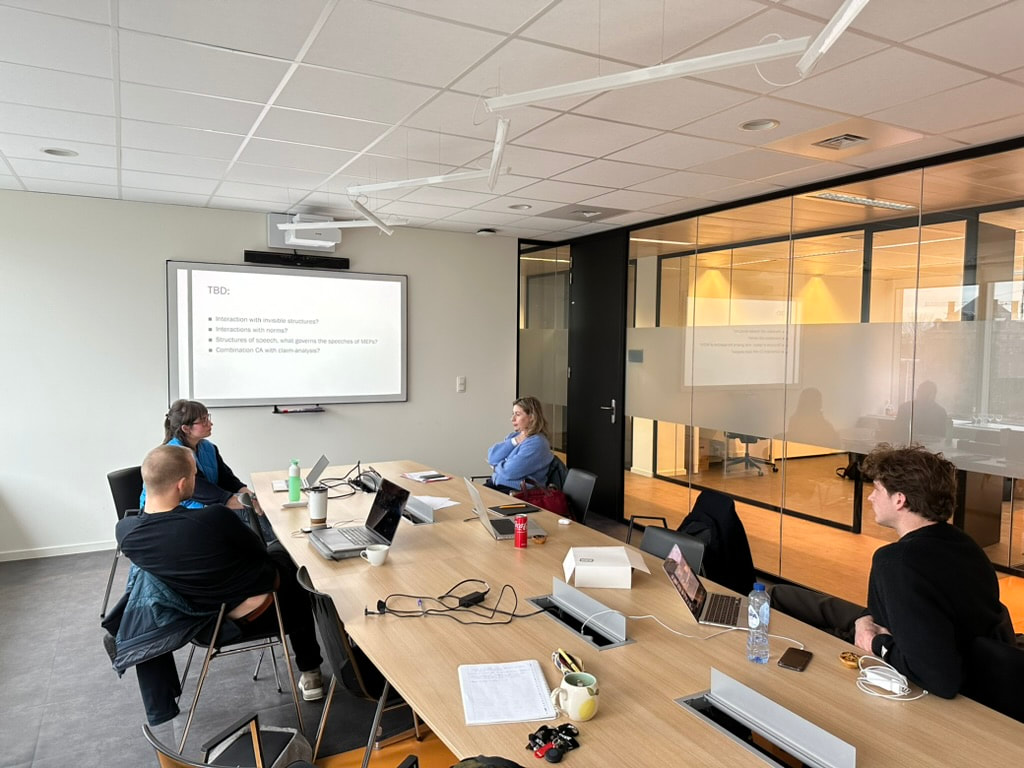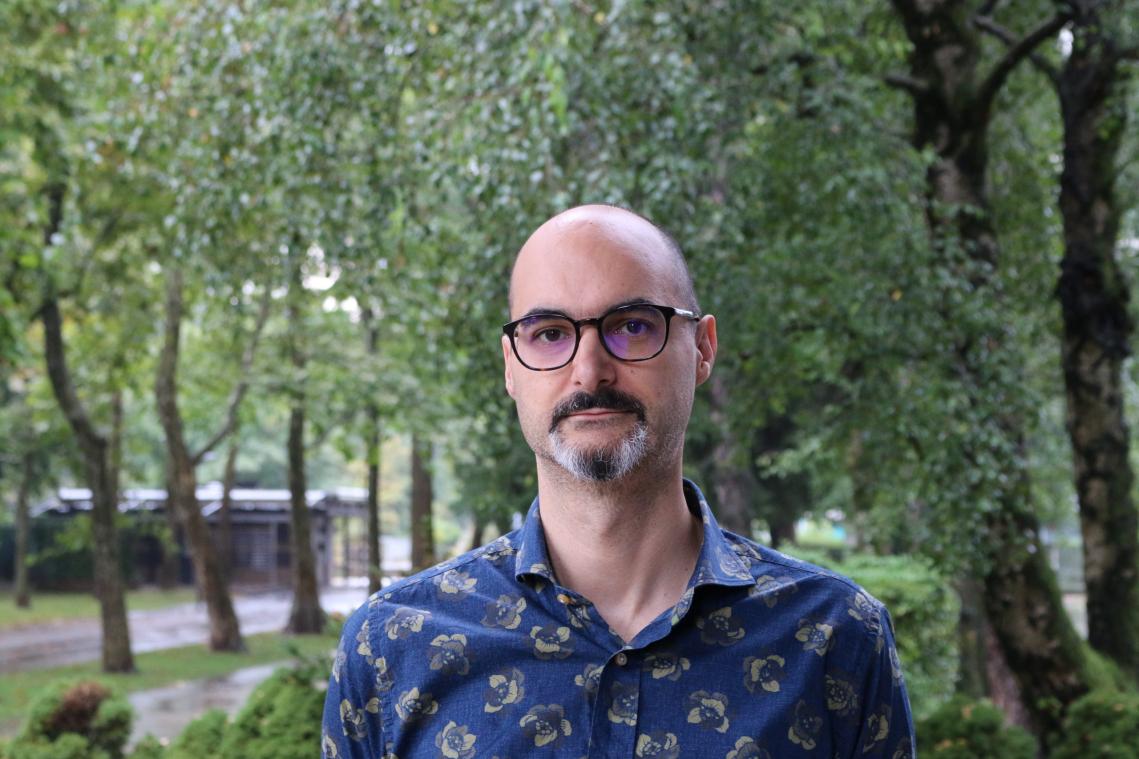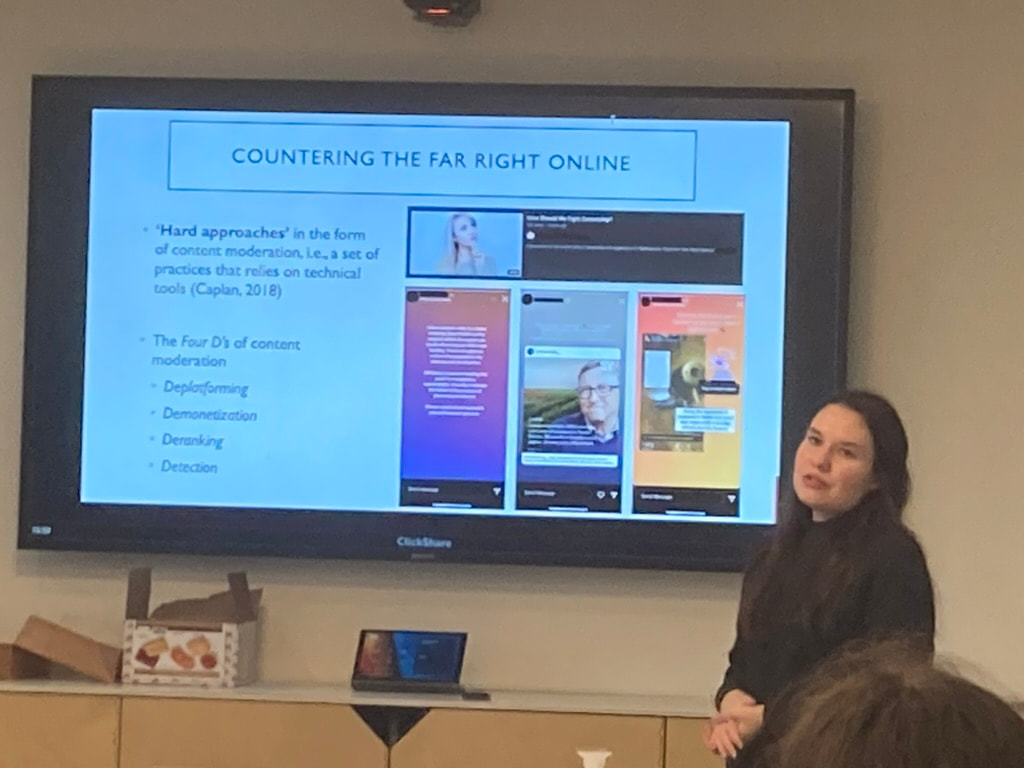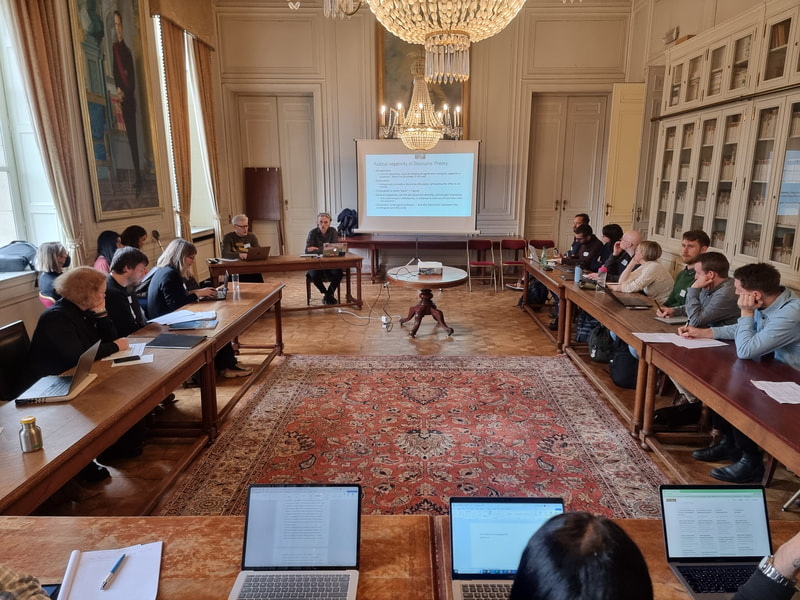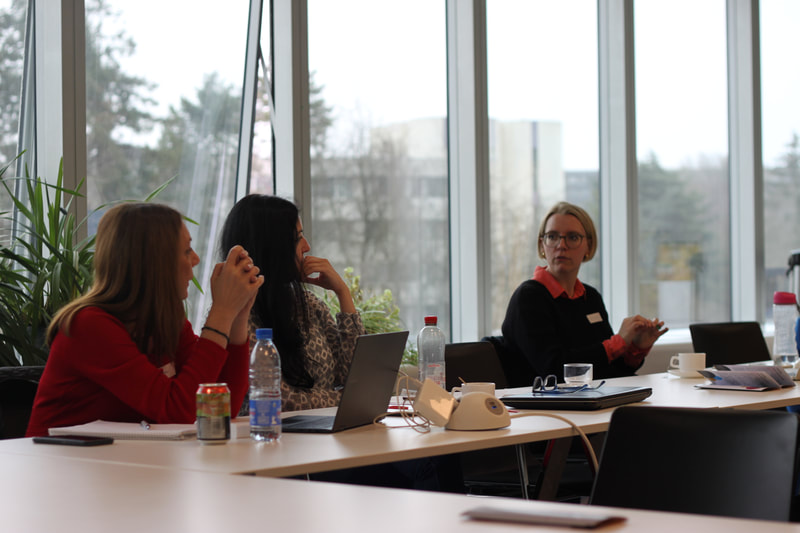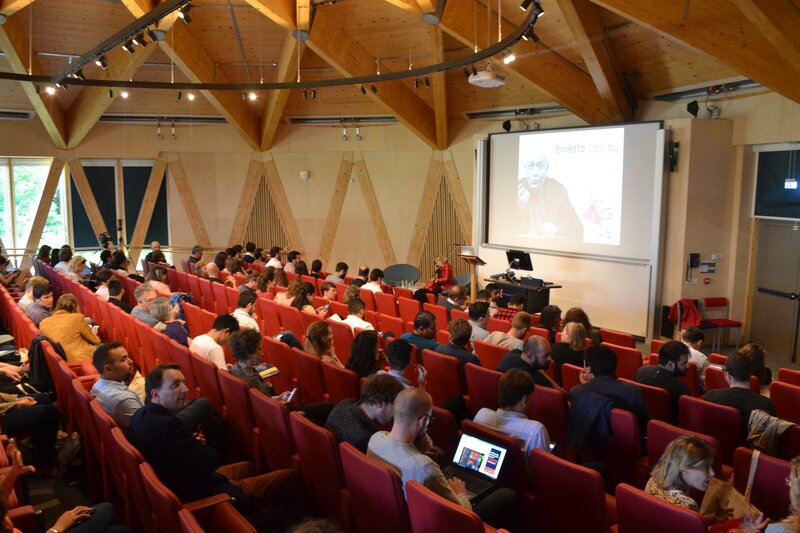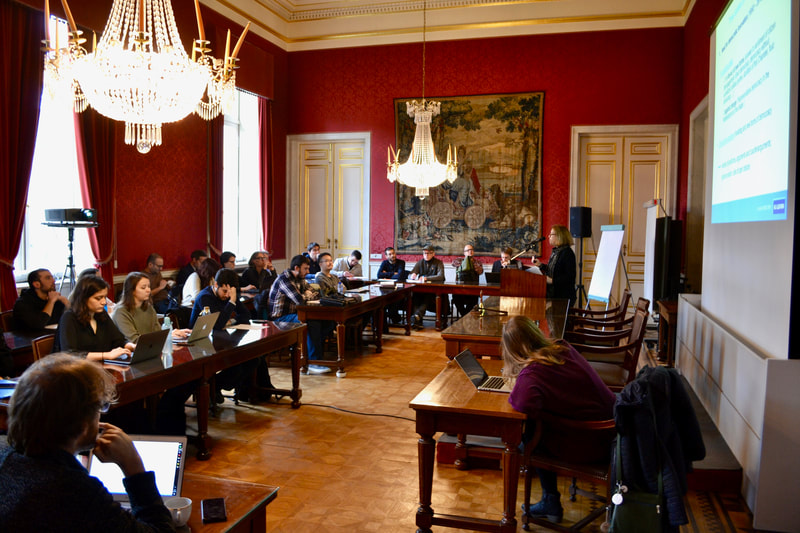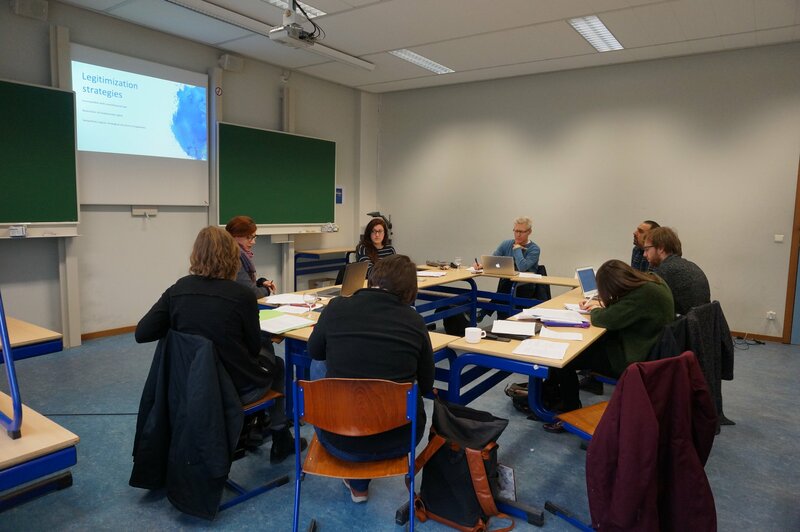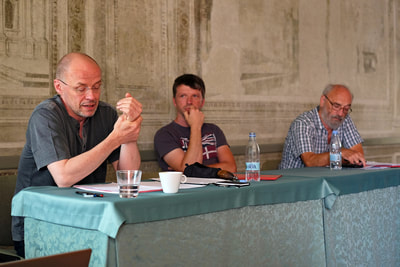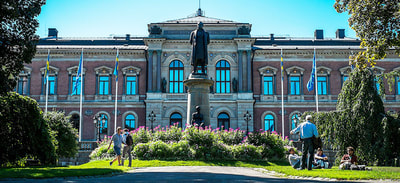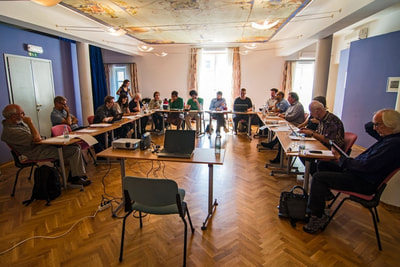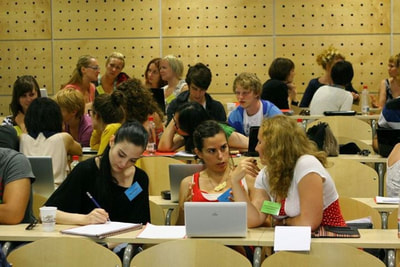conferences and workshops
Desire Seminar series at VUB
2024
episode 36 / 24.5.2024: Maximilian grönegräs, benjamin de cleen, yazan badran, nicolò pennucci
Maximilian Grönegräs, Benjamin De Cleen & Yazan Badran - “Don’t hate the media, be the media!”: the appropriation
of journalistic authority by the Vlaams Belang
The intermixing of journalistic and political forms of communication have become increasingly common within the context of contemporary developments that some have described as fourth age of political communication and others as hybrid media system. One result of this intermixing is the extraction and reutilisation of journalistic elements for political communication purposes, a practice that can be observed in particular frequency and intensity with populist radical right (PRR) parties. The practice entails, among other elements, the appropriation of claims to liberal democratic media norms – allowing politicians to adorn themselves with plumes they borrow from journalists, such as journalism’s independence and autonomy, its objectivity norm, and its truth claims. This article conducts a multimodal content analysis of two political communication outlets by the Belgian PRR party Vlaams Belang [Flemish Interest] (VB) that are both based on a strikingly extensive use of journalistic elements: the news talk show VBTV and the news website V-NIEUWS. The analysis zooms in on (1) these two platforms’ self-understanding as media, which they primarily formulate on the basis of their critique of as well as relationship with other Belgian media actors, on (2) the platforms’ concrete practices, which heavily rely on the appropriation of journalistic elements, and (3) the platforms’ sense of their partisan ties to the political party VB and how they navigate these.
Nicolò Pennucci - Different approaches to populism: a conceptual map
This chapter of a PhD dissertation reviews the relevant literature on populism, anti populism and the movement-countermovement approach in social movement studies. The dissertation aims at introducing the innovative concept of counter-populism in order to overcome some limitations of the term anti-populism. By looking at social movement activism in a comparative perspective, the dissertation aims to broaden the understanding of the relationship between populism, the opposition to populism and liberal democracy by looking at case studies in three countries: Italy, the United Kingdom and the United States.
of journalistic authority by the Vlaams Belang
The intermixing of journalistic and political forms of communication have become increasingly common within the context of contemporary developments that some have described as fourth age of political communication and others as hybrid media system. One result of this intermixing is the extraction and reutilisation of journalistic elements for political communication purposes, a practice that can be observed in particular frequency and intensity with populist radical right (PRR) parties. The practice entails, among other elements, the appropriation of claims to liberal democratic media norms – allowing politicians to adorn themselves with plumes they borrow from journalists, such as journalism’s independence and autonomy, its objectivity norm, and its truth claims. This article conducts a multimodal content analysis of two political communication outlets by the Belgian PRR party Vlaams Belang [Flemish Interest] (VB) that are both based on a strikingly extensive use of journalistic elements: the news talk show VBTV and the news website V-NIEUWS. The analysis zooms in on (1) these two platforms’ self-understanding as media, which they primarily formulate on the basis of their critique of as well as relationship with other Belgian media actors, on (2) the platforms’ concrete practices, which heavily rely on the appropriation of journalistic elements, and (3) the platforms’ sense of their partisan ties to the political party VB and how they navigate these.
Nicolò Pennucci - Different approaches to populism: a conceptual map
This chapter of a PhD dissertation reviews the relevant literature on populism, anti populism and the movement-countermovement approach in social movement studies. The dissertation aims at introducing the innovative concept of counter-populism in order to overcome some limitations of the term anti-populism. By looking at social movement activism in a comparative perspective, the dissertation aims to broaden the understanding of the relationship between populism, the opposition to populism and liberal democracy by looking at case studies in three countries: Italy, the United Kingdom and the United States.
EPISODE 35 / 26.4.2024: OMRAN SHROUFI
Omran Shroufi - Europhilia: A conceptual, empirical and normative understanding of the discourse of pro-EU actors in the UK, Germany and Poland
While Euroscepticism has become a major object of social scientific study, this project offers a highly original exploration of the flipside of this debate, a close attachment to and defence of the EU, referred to here as ‘Europhilia’. As scholarly debates have overlooked how pro-EU actors politicise the EU, the phenomenon of Europhilia remains undertheorized and empirically understudied. Where it has been investigated, Europhilia has primarily been viewed as a party position or form of activism. Exploring Europhilia as a discourse – that subjectively views and interprets the world – this project seeks to develop an innovative understanding of a phenomenon that has, to date, largely existed in the shadows. While Eurosceptic actors may be commonly located on the extremes, this project turns its gaze on the Europhilic discourse of the centre. Combining multi-sited ethnography with a textual analysis, the project will collect data from three pan-European, pro-EU organisations – a political party (Volt Europa), campaigning group (European Movement International) and think tank (the European Council on Foreign Relations) - operating in different but interrelated locations – the UK, Germany and Poland – to close a pressing gap and provide a detailed conceptual, empirical and normative understanding of Europhilia.
While Euroscepticism has become a major object of social scientific study, this project offers a highly original exploration of the flipside of this debate, a close attachment to and defence of the EU, referred to here as ‘Europhilia’. As scholarly debates have overlooked how pro-EU actors politicise the EU, the phenomenon of Europhilia remains undertheorized and empirically understudied. Where it has been investigated, Europhilia has primarily been viewed as a party position or form of activism. Exploring Europhilia as a discourse – that subjectively views and interprets the world – this project seeks to develop an innovative understanding of a phenomenon that has, to date, largely existed in the shadows. While Eurosceptic actors may be commonly located on the extremes, this project turns its gaze on the Europhilic discourse of the centre. Combining multi-sited ethnography with a textual analysis, the project will collect data from three pan-European, pro-EU organisations – a political party (Volt Europa), campaigning group (European Movement International) and think tank (the European Council on Foreign Relations) - operating in different but interrelated locations – the UK, Germany and Poland – to close a pressing gap and provide a detailed conceptual, empirical and normative understanding of Europhilia.
EPISODE 34 / 22.3.2024: ADAM DINSMORE, NICOLÒ PENNUCCI
Adam Dinsmore - Complexity & Complication: how left and right constrcut distinct 'elites'
The elite’ is one of two main building blocks typically present in populist discourse (along with 'the people'). Differences between left- and right-wing populisms have thus been explained according to the notions of ‘the elite’ typically constructed by each (Canovan 1999, Ostiguy & Casullo 2017). However, populists do not construct ‘the elite’ ex nihilo. To appeal to their target audiences, populists draw on notions of elites already latent in society. If different political tribes hold distinct notions of elites a priori then differences between le- and right-wing populisms may pre-exist their articulation in populist discourses. To test this idea, thirty-six qualitative interviews were conducted with members of four political parties living in the North of England. Participants were asked to describe ‘elites’ as they understood the concept in contemporary Britain. Findings revealed partisan differences. Left-wing participants described an indivisible social stratum in which many forms of elite power were bound together (e.g. political, economic, hereditary, etc). Centre/right-wing participants tended to describe a much looser assemblage of discrete power centres. Drawing on concepts developed by Latour (1996) I characterise the all-in-one left-wing elite as ‘complex’ and the one-by-one centre/right-wing elite as ‘complicated.’ If complicated elite construction is more common on the political right, this may explain the greater propensity of right-wing populisms to construct selective antagonisms that oppose some elites while supporting others – a phenomenon termed ‘populism of the privileged’ by De Cleen & Ruiz Casado (2023).
Nicolò Pennucci - Countering Right-Wing Populism in the US in the Aftermath of Donald Trump
This chapter of a PhD dissertation is on the civil society reaction to right-wing populism in power in a comparative perspective. The dissertation aims at introducing the innovative concept of counter-populism in order to overcome some limitations of the term anti-populism. By looking at social movement activism in a comparative perspective, the dissertation aims to broaden the understanding of the relationship between populism, the opposition to populism and liberal democracy by looking at case studies in three countries: Italy, the United Kingdom and the United States. This chapter looks at the United States.
The elite’ is one of two main building blocks typically present in populist discourse (along with 'the people'). Differences between left- and right-wing populisms have thus been explained according to the notions of ‘the elite’ typically constructed by each (Canovan 1999, Ostiguy & Casullo 2017). However, populists do not construct ‘the elite’ ex nihilo. To appeal to their target audiences, populists draw on notions of elites already latent in society. If different political tribes hold distinct notions of elites a priori then differences between le- and right-wing populisms may pre-exist their articulation in populist discourses. To test this idea, thirty-six qualitative interviews were conducted with members of four political parties living in the North of England. Participants were asked to describe ‘elites’ as they understood the concept in contemporary Britain. Findings revealed partisan differences. Left-wing participants described an indivisible social stratum in which many forms of elite power were bound together (e.g. political, economic, hereditary, etc). Centre/right-wing participants tended to describe a much looser assemblage of discrete power centres. Drawing on concepts developed by Latour (1996) I characterise the all-in-one left-wing elite as ‘complex’ and the one-by-one centre/right-wing elite as ‘complicated.’ If complicated elite construction is more common on the political right, this may explain the greater propensity of right-wing populisms to construct selective antagonisms that oppose some elites while supporting others – a phenomenon termed ‘populism of the privileged’ by De Cleen & Ruiz Casado (2023).
Nicolò Pennucci - Countering Right-Wing Populism in the US in the Aftermath of Donald Trump
This chapter of a PhD dissertation is on the civil society reaction to right-wing populism in power in a comparative perspective. The dissertation aims at introducing the innovative concept of counter-populism in order to overcome some limitations of the term anti-populism. By looking at social movement activism in a comparative perspective, the dissertation aims to broaden the understanding of the relationship between populism, the opposition to populism and liberal democracy by looking at case studies in three countries: Italy, the United Kingdom and the United States. This chapter looks at the United States.
EPISODE 33 / 16.2.2024: THÉO AIOLFI, OMRAN SHROUFI
Briar Dickey - Narrative-Driven Video Games and the Gender Politics of the Far-Right
This proposed PhD project centres video games as an avenue for exploring the role of popular culture for the far-right. Taking into account the role of both participatory cultures and influence and microcelebrity in proliferating far-right politics, it considers both their role as in relation to the collective identities formed through far-right participatory cultures and their strategic role for far-right digital influencers. Centring video games, which are uniquely attached to a shared sense of aggrieved masculinity, provides a powerful avenue for better understanding the role of reactionary fandom in far-right politics, as well as how far-right influencers and microcelebrities utilise games and gaming as a means of connecting with wider audiences.
Karel Deneckere & Benjamin De Cleen - Dislocation and repair: The discursive struggle over nuclear power in Belgium in the wake of Three Mile Island, Chernobyl and Fukushima
Since the early 1970s, the idea of applying nuclear power to generate electricity has given rise to an ongoing, but shift-shaping public controversy. Beyond more obvious technical debates on how societies ideally foresee in their energy needs, the controversy also conceals a deeper clash between a hegemonic and counter-hegemonic worldviews about humans’ relationship with their natural environment. This article adopts the perspective of Discourse Theory (DT) to analyze the politics for and against nuclear energy in the wake of three large-scale nuclear accidents: Three Mile Island in 1979, Chernobyl in 1986, and Fukushima in 2011. Our analysis shows that large-scale nuclear accidents both challenge the status quo and provide opportunities for social change in terms of articulating and promoting alternative worldviews. At first sight, the accidents’ impact on the controversy seems rather superficial. While the technology’s opponents cannot sufficiently capitalize on the opportunities, nuclear advocates prove relatively successful in neutralizing the discursive threat they posed. A cross-case comparison, however, reveals a gradual erosion of the hegemonic pro-nuclear discourse, suggesting a gradual turning of the table to the opponents’ advantage. On a more theoretical level, our analysis allows us to conceive of the nuclear power issue as an ongoing discursive struggle for hegemony that plays out on three analytically distinct, but empirically interconnected levels of abstraction: nuclear power, the role of energy in society, humans’ relations to their environment.
This proposed PhD project centres video games as an avenue for exploring the role of popular culture for the far-right. Taking into account the role of both participatory cultures and influence and microcelebrity in proliferating far-right politics, it considers both their role as in relation to the collective identities formed through far-right participatory cultures and their strategic role for far-right digital influencers. Centring video games, which are uniquely attached to a shared sense of aggrieved masculinity, provides a powerful avenue for better understanding the role of reactionary fandom in far-right politics, as well as how far-right influencers and microcelebrities utilise games and gaming as a means of connecting with wider audiences.
Karel Deneckere & Benjamin De Cleen - Dislocation and repair: The discursive struggle over nuclear power in Belgium in the wake of Three Mile Island, Chernobyl and Fukushima
Since the early 1970s, the idea of applying nuclear power to generate electricity has given rise to an ongoing, but shift-shaping public controversy. Beyond more obvious technical debates on how societies ideally foresee in their energy needs, the controversy also conceals a deeper clash between a hegemonic and counter-hegemonic worldviews about humans’ relationship with their natural environment. This article adopts the perspective of Discourse Theory (DT) to analyze the politics for and against nuclear energy in the wake of three large-scale nuclear accidents: Three Mile Island in 1979, Chernobyl in 1986, and Fukushima in 2011. Our analysis shows that large-scale nuclear accidents both challenge the status quo and provide opportunities for social change in terms of articulating and promoting alternative worldviews. At first sight, the accidents’ impact on the controversy seems rather superficial. While the technology’s opponents cannot sufficiently capitalize on the opportunities, nuclear advocates prove relatively successful in neutralizing the discursive threat they posed. A cross-case comparison, however, reveals a gradual erosion of the hegemonic pro-nuclear discourse, suggesting a gradual turning of the table to the opponents’ advantage. On a more theoretical level, our analysis allows us to conceive of the nuclear power issue as an ongoing discursive struggle for hegemony that plays out on three analytically distinct, but empirically interconnected levels of abstraction: nuclear power, the role of energy in society, humans’ relations to their environment.
EPISODE 32 / 19.1.2024: BRIAR DICKEY, KAREL DENECKERE, BENJAMIN DE CLEEN
Briar Dickey - Narrative-Driven Video Games and the Gender Politics of the Far-Right
This proposed PhD project centres video games as an avenue for exploring the role of popular culture for the far-right. Taking into account the role of both participatory cultures and influence and microcelebrity in proliferating far-right politics, it considers both their role as in relation to the collective identities formed through far-right participatory cultures and their strategic role for far-right digital influencers. Centring video games, which are uniquely attached to a shared sense of aggrieved masculinity, provides a powerful avenue for better understanding the role of reactionary fandom in far-right politics, as well as how far-right influencers and microcelebrities utilise games and gaming as a means of connecting with wider audiences.
Karel Deneckere & Benjamin De Cleen - Dislocation and repair: The discursive struggle over nuclear power in Belgium in the wake of Three Mile Island, Chernobyl and Fukushima
Since the early 1970s, the idea of applying nuclear power to generate electricity has given rise to an ongoing, but shift-shaping public controversy. Beyond more obvious technical debates on how societies ideally foresee in their energy needs, the controversy also conceals a deeper clash between a hegemonic and counter-hegemonic worldviews about humans’ relationship with their natural environment. This article adopts the perspective of Discourse Theory (DT) to analyze the politics for and against nuclear energy in the wake of three large-scale nuclear accidents: Three Mile Island in 1979, Chernobyl in 1986, and Fukushima in 2011. Our analysis shows that large-scale nuclear accidents both challenge the status quo and provide opportunities for social change in terms of articulating and promoting alternative worldviews. At first sight, the accidents’ impact on the controversy seems rather superficial. While the technology’s opponents cannot sufficiently capitalize on the opportunities, nuclear advocates prove relatively successful in neutralizing the discursive threat they posed. A cross-case comparison, however, reveals a gradual erosion of the hegemonic pro-nuclear discourse, suggesting a gradual turning of the table to the opponents’ advantage. On a more theoretical level, our analysis allows us to conceive of the nuclear power issue as an ongoing discursive struggle for hegemony that plays out on three analytically distinct, but empirically interconnected levels of abstraction: nuclear power, the role of energy in society, humans’ relations to their environment.
This proposed PhD project centres video games as an avenue for exploring the role of popular culture for the far-right. Taking into account the role of both participatory cultures and influence and microcelebrity in proliferating far-right politics, it considers both their role as in relation to the collective identities formed through far-right participatory cultures and their strategic role for far-right digital influencers. Centring video games, which are uniquely attached to a shared sense of aggrieved masculinity, provides a powerful avenue for better understanding the role of reactionary fandom in far-right politics, as well as how far-right influencers and microcelebrities utilise games and gaming as a means of connecting with wider audiences.
Karel Deneckere & Benjamin De Cleen - Dislocation and repair: The discursive struggle over nuclear power in Belgium in the wake of Three Mile Island, Chernobyl and Fukushima
Since the early 1970s, the idea of applying nuclear power to generate electricity has given rise to an ongoing, but shift-shaping public controversy. Beyond more obvious technical debates on how societies ideally foresee in their energy needs, the controversy also conceals a deeper clash between a hegemonic and counter-hegemonic worldviews about humans’ relationship with their natural environment. This article adopts the perspective of Discourse Theory (DT) to analyze the politics for and against nuclear energy in the wake of three large-scale nuclear accidents: Three Mile Island in 1979, Chernobyl in 1986, and Fukushima in 2011. Our analysis shows that large-scale nuclear accidents both challenge the status quo and provide opportunities for social change in terms of articulating and promoting alternative worldviews. At first sight, the accidents’ impact on the controversy seems rather superficial. While the technology’s opponents cannot sufficiently capitalize on the opportunities, nuclear advocates prove relatively successful in neutralizing the discursive threat they posed. A cross-case comparison, however, reveals a gradual erosion of the hegemonic pro-nuclear discourse, suggesting a gradual turning of the table to the opponents’ advantage. On a more theoretical level, our analysis allows us to conceive of the nuclear power issue as an ongoing discursive struggle for hegemony that plays out on three analytically distinct, but empirically interconnected levels of abstraction: nuclear power, the role of energy in society, humans’ relations to their environment.
2023
EPISODE 31 / 8.12.2023: Gijs Lambrechts, Ilija Tomanić Trivundza, Igor Vobič
Gijs Lambrechts - Is brown turning green? Analyzing the environmental discourse of Vlaams Belang, Partij voor de Vrijheid, and Rassemblement National across three election years
Although the democratic and climate crises are two defining features of 21st-century politics, there is a significant gap in the academic literature concerning the nexus between both. This proposed research fills this gap by studying the diverse and complex relationship between the populist radical right (PRR) and environmentalism in the case of Belgium’s Vlaams Belang (VB), the Netherlands’ Partij voor de Vrijheid (PVV), and France’s Rassemblement National (RN) across three election years. The methodological approach builds upon a three-dimensional model of Critical Discourse Analysis that combines textual analysis, discourse-theoretical analysis, and socio-political analysis.
Ilija Tomanić Trivundza & Igor Vobič - Not minding the paradigmatic gap: Gullible journalism and the failings of liberal responses to illiberalism
Fake news should be a rude awakening for journalism. However, professional journalism appears gullible and devoid of proper answers – not only as a critical link in public life based on facts and reasoned arguments, but also as a builder of community and collective sense-making. This multiple case study explores how professional journalism reacts to the fake news tactics of political power holders – the pejorative labelling of journalists, fabrication and manipulation of facts, and disciplining journalists through disinformation – through which the latter aim to secure a post-truth information ecology and gain from its epistemological vagueness. It shows how journalistic responses have deepened the paradigmatic gap between the illiberal tendencies of political actors and the liberal principles of professional journalism – not by dismantling illiberalism, but by effectively feeding into the post-truth.
Although the democratic and climate crises are two defining features of 21st-century politics, there is a significant gap in the academic literature concerning the nexus between both. This proposed research fills this gap by studying the diverse and complex relationship between the populist radical right (PRR) and environmentalism in the case of Belgium’s Vlaams Belang (VB), the Netherlands’ Partij voor de Vrijheid (PVV), and France’s Rassemblement National (RN) across three election years. The methodological approach builds upon a three-dimensional model of Critical Discourse Analysis that combines textual analysis, discourse-theoretical analysis, and socio-political analysis.
Ilija Tomanić Trivundza & Igor Vobič - Not minding the paradigmatic gap: Gullible journalism and the failings of liberal responses to illiberalism
Fake news should be a rude awakening for journalism. However, professional journalism appears gullible and devoid of proper answers – not only as a critical link in public life based on facts and reasoned arguments, but also as a builder of community and collective sense-making. This multiple case study explores how professional journalism reacts to the fake news tactics of political power holders – the pejorative labelling of journalists, fabrication and manipulation of facts, and disciplining journalists through disinformation – through which the latter aim to secure a post-truth information ecology and gain from its epistemological vagueness. It shows how journalistic responses have deepened the paradigmatic gap between the illiberal tendencies of political actors and the liberal principles of professional journalism – not by dismantling illiberalism, but by effectively feeding into the post-truth.
EPISODE 30 / 10.11.2023: Lazaros Karavasilis, Jacopo Custodi, Laura Chazel, Fatima zahid Ali
Lazaros Karavasilis, Jacopo Custodi & Laura Chazel - How Do Radical Left Parties Frame the Nation? A Comparison BetweenGreece, Spain and France
The trajectory of radical left parties during the 2010s is one of the most critical aspects of contemporary European politics. Indeed, the decline of traditional social-democratic parties allowed the flourishment of political formations that positioned themselves on the left of these parties and addressed issues that the mainstream left could no longer do. Scholars have explored these issues within the radical left discourse, manifestos, and communication to examine how these parties addressed austerity politics, their relationship with the EU, or how they developed their political strategy. What has received minimal attention though, is how these parties frame the nation in their respective countries and how they talk about the national element. This paper aims to expand the range of the existing studies that have examined the issue of the nation in the radical left, by comparing the three most prominent radical left parties in Europe: SYRIZA in Greece, Podemos in Spain, and La France Insourmise in France. Following a discursive-analytical approach to speeches and interviews by each party’s leadership our goal is to focus on how all of the examined cases employed a form of left-wing patriotism to incorporate the national element in their discourses. Ultimately, our goal is to highlight an often-neglected aspect of the radical left family by analysing it through its comparative potential.
Fatima Zahid Ali - "I Eat Transphobes For Breakfasts": Politics of postcolonial language appropriation & abrogation on Instagram.
Marginalized communities in postcolonial states, in particular transgender people, face unique challenges when consciously displaying their gender and/or sexual identity. Drawing upon postcolonial concepts of appropriation and abrogation – typically only limited to the literary tradition – this paper seeks to understand how colonial language and aesthetics are articulated in media by diverse transgender activists in the Pakistani context. We do this through the case study of the indigenous khwajasira community – an overarching term for transgender, non-binary, and gender nonconforming people, often known as the “third gender” or as gender category X in legal communication. We study the tension between linguistic appropriation and abrogation (Ashcroft, Griffiths, & Tiffin, 1989) combined with multimodal critical discourse analysis (Kress & van Leeuwen, 2006; Machin & Mayr 2012) on Instagram posts by bilingual/multilingual activists with a primary focus on English and Urdu. We delineate four Pakistani khwajasira activists including Mehrub Moiz Awan, Shahzadi Rai, Hina Baloch and Nayyab Ali as they utilize both English and Urdu languages in their advocacy efforts. Through a close reading of online cultural artefacts and texts from these activists, we analyze language as a fraught and contested site through which the postcolonial condition is negotiated for those on the margins. In terms of media corpus from all activists, we collected around 600 social media posts from their public Instagram accounts. By limiting the inquiry to reels, Instagram videos, Lives, and images with all corresponding captions, we evaluate innovative linguistic and textual strategies such as untranslated words, codeswitching, codemixing, metonymy, interlanguage, and neologism. By examining the language practices of Mehrub, Shahzadi, Hina, and Nayyab, this paper captures a range of perspectives and linguistic expressions within the khwajasira community. That combined with the level of scrutiny and attention that these activists garner on mainstream/alternative and local/international media, we provide a unique lens into the tensions and challenges of the postcolonial ‘subaltern’ subject. Our exploration of social media texts and the discourses surrounding them reveal nuanced insights into the ways in which marginalized communities use language to resist, decolonize, and dismantle dominant power relations. Through these activists, this paper contributes to our understanding of the complex interplay of language, identity, and ‘transness’ in postcolonial milieus. Beyond this, the article emphasizes the need to decenter Anglo-European perspectives within the broader LGBTQI+ movement, in shaping our scholarly understanding of queer discursive processes and practices emerging in South Asia.
The trajectory of radical left parties during the 2010s is one of the most critical aspects of contemporary European politics. Indeed, the decline of traditional social-democratic parties allowed the flourishment of political formations that positioned themselves on the left of these parties and addressed issues that the mainstream left could no longer do. Scholars have explored these issues within the radical left discourse, manifestos, and communication to examine how these parties addressed austerity politics, their relationship with the EU, or how they developed their political strategy. What has received minimal attention though, is how these parties frame the nation in their respective countries and how they talk about the national element. This paper aims to expand the range of the existing studies that have examined the issue of the nation in the radical left, by comparing the three most prominent radical left parties in Europe: SYRIZA in Greece, Podemos in Spain, and La France Insourmise in France. Following a discursive-analytical approach to speeches and interviews by each party’s leadership our goal is to focus on how all of the examined cases employed a form of left-wing patriotism to incorporate the national element in their discourses. Ultimately, our goal is to highlight an often-neglected aspect of the radical left family by analysing it through its comparative potential.
Fatima Zahid Ali - "I Eat Transphobes For Breakfasts": Politics of postcolonial language appropriation & abrogation on Instagram.
Marginalized communities in postcolonial states, in particular transgender people, face unique challenges when consciously displaying their gender and/or sexual identity. Drawing upon postcolonial concepts of appropriation and abrogation – typically only limited to the literary tradition – this paper seeks to understand how colonial language and aesthetics are articulated in media by diverse transgender activists in the Pakistani context. We do this through the case study of the indigenous khwajasira community – an overarching term for transgender, non-binary, and gender nonconforming people, often known as the “third gender” or as gender category X in legal communication. We study the tension between linguistic appropriation and abrogation (Ashcroft, Griffiths, & Tiffin, 1989) combined with multimodal critical discourse analysis (Kress & van Leeuwen, 2006; Machin & Mayr 2012) on Instagram posts by bilingual/multilingual activists with a primary focus on English and Urdu. We delineate four Pakistani khwajasira activists including Mehrub Moiz Awan, Shahzadi Rai, Hina Baloch and Nayyab Ali as they utilize both English and Urdu languages in their advocacy efforts. Through a close reading of online cultural artefacts and texts from these activists, we analyze language as a fraught and contested site through which the postcolonial condition is negotiated for those on the margins. In terms of media corpus from all activists, we collected around 600 social media posts from their public Instagram accounts. By limiting the inquiry to reels, Instagram videos, Lives, and images with all corresponding captions, we evaluate innovative linguistic and textual strategies such as untranslated words, codeswitching, codemixing, metonymy, interlanguage, and neologism. By examining the language practices of Mehrub, Shahzadi, Hina, and Nayyab, this paper captures a range of perspectives and linguistic expressions within the khwajasira community. That combined with the level of scrutiny and attention that these activists garner on mainstream/alternative and local/international media, we provide a unique lens into the tensions and challenges of the postcolonial ‘subaltern’ subject. Our exploration of social media texts and the discourses surrounding them reveal nuanced insights into the ways in which marginalized communities use language to resist, decolonize, and dismantle dominant power relations. Through these activists, this paper contributes to our understanding of the complex interplay of language, identity, and ‘transness’ in postcolonial milieus. Beyond this, the article emphasizes the need to decenter Anglo-European perspectives within the broader LGBTQI+ movement, in shaping our scholarly understanding of queer discursive processes and practices emerging in South Asia.
EPISODE 29 / 13.10.2023: MAXIMILIAN GRÖNEGRÄS, BENJAMIN DE CLEEN, YAZAN BADRAN, SAVVAS VOUTYRAS
Maximilian Grönegräs, Benjamin De Cleen & Yazan Badran - "Don't hate the media, be the media!": a genre-based perspective on pseudo-journalistic political communication
This article proposes the term pseudo-journalistic political communication to capture the use of journalistic genre elements in the political communication by (primarily populist radical right) parties. The term is based on a five-fold genre framework conisting of a genre's purpose, production, content, form, and reception. The term is tested on a case study in form of the Belgian Vlaams Belang's political communication.
Savvas Voutyras - Socio-cultural Aspects of Anti-populism: Depictions of Brexit supporters in online Remain communities
The primary aim of this paper is to shed light on the socio-cultural aspects and manifestations of anti-populism, a phenomenon that remains relatively neglected, despite some excellent work in this area we have seen in recent years. The phenomenon is examined at hand of different online Remain communities on Reddit and Facebook, the largest of which is the Facebook satire page ‘Very Brexit
Problems’, with a membership of more than 246,000, and its sibling group ‘The Very Brexit Problems Club’.
This article proposes the term pseudo-journalistic political communication to capture the use of journalistic genre elements in the political communication by (primarily populist radical right) parties. The term is based on a five-fold genre framework conisting of a genre's purpose, production, content, form, and reception. The term is tested on a case study in form of the Belgian Vlaams Belang's political communication.
Savvas Voutyras - Socio-cultural Aspects of Anti-populism: Depictions of Brexit supporters in online Remain communities
The primary aim of this paper is to shed light on the socio-cultural aspects and manifestations of anti-populism, a phenomenon that remains relatively neglected, despite some excellent work in this area we have seen in recent years. The phenomenon is examined at hand of different online Remain communities on Reddit and Facebook, the largest of which is the Facebook satire page ‘Very Brexit
Problems’, with a membership of more than 246,000, and its sibling group ‘The Very Brexit Problems Club’.
EPISODE 28 / 15.9.2023: ARCHIBALD GUSTIN, OMRAN SHROUFI
Archibald Gustin - Chapter 2: Gender and far right politics
This chapter is part of a doctoral dissertation on gender discourses of far right parties.
Omran Shroufi - The Cause and Effect of False Binaries in Discourses about the Far Right
This postdoc proposal aims at better understanding the cause and effect of false binaries in discourses about the far right.
This chapter is part of a doctoral dissertation on gender discourses of far right parties.
Omran Shroufi - The Cause and Effect of False Binaries in Discourses about the Far Right
This postdoc proposal aims at better understanding the cause and effect of false binaries in discourses about the far right.
EPISODE 27 / 15.6.2023: SAVVAS VOUTYRAS, OMRAN SHROUFI
Savvas Voutyras - From liberalism to anti-populism: a rhetorical approach to an ideological transformation
During the last decade, we have experienced the polarisation of political life, highlighted in conflicts over issues like immigration and economic agendas, the decline of trust towards institutions, established parties and elites, and the instability of political systems. ‘Populism’ is the force often blamed by politicians, media, and analysts for these negative developments and their causes. However, what remains strikingly understudied is the specific ways in which the traditional liberal centrist political and media forces have been trying to counter populism and the challenges it presents – i.e., anti- populism. This is particularly important, if we consider that virtually no political actor claims to be a ‘populist’, and that ‘populism’ usually serves as a negative label attached by centrist actors to their opponents of all political orientations. But the issue with ‘populism’s’ use as a framing device in this way is not simply about questions of accuracy or inaccuracy. Such uses have their own performative effects on political communication and political conduct more generally; most importantly, the emergence of ‘anti-populism’ as a distinct political discourse. This paper combines insights discourse theoretical and rhetorical approaches to political ideology to make sense of anti-populism, including its rhetorical style and forms of appeal. The paper supports that anti-populism should be understood as an ideological transformation of the liberal centre. A key insight is that an ideology – understood in rhetorical-discursive terms, rather than as a fixed set of principles – changes according to the way in which it constructs its opponents (i.e., ‘populism’) and the arguments it deploys against them. Two tasks the paper attempts to carry out, then, is to flesh out the core features of this transformation, and to critically highlight its implications for politics and democracy, using as a case study the interplay between populism and liberal democracy in the discourse of Tony Blair Institute for Global Change.
Omran Shroufi - Exploring the Diversity of Far Right Positions towards Israel/Palestine: A German Case Study
This article shows how the German radical right party Alternative für Deutschland (AfD)'s and the extreme right party Nationaldemokratische Partei Deutschlands (NPD)'s discourses on Isreael and the Palestinians differ significantly from one another, with the AfD expressing vocal support for Israel and accusing the German government of damaging German-Israeli relations, while the NPD posits Israel as a dangerous, pariah state and rejects the notion of shared German-Israeli values. The results of a thematic analysis illustrate how the NPD derides the AfD and other like-minded far right parties for seemingly caving into pressure
and supporting Israel. While the article, therefore, confirms that the parties adopt almost diametrically opposed positions, the findings do indicate a degree of similarity in how the two different ‘types’ of far right party discuss Israel/Palestine, with both parties positing a racialised ‘other’ as ‘our’ enemy. In doing so, the article’s findings feed into broader theoretical discussions about how fundamentally different radical and extreme right parties are from one another.
During the last decade, we have experienced the polarisation of political life, highlighted in conflicts over issues like immigration and economic agendas, the decline of trust towards institutions, established parties and elites, and the instability of political systems. ‘Populism’ is the force often blamed by politicians, media, and analysts for these negative developments and their causes. However, what remains strikingly understudied is the specific ways in which the traditional liberal centrist political and media forces have been trying to counter populism and the challenges it presents – i.e., anti- populism. This is particularly important, if we consider that virtually no political actor claims to be a ‘populist’, and that ‘populism’ usually serves as a negative label attached by centrist actors to their opponents of all political orientations. But the issue with ‘populism’s’ use as a framing device in this way is not simply about questions of accuracy or inaccuracy. Such uses have their own performative effects on political communication and political conduct more generally; most importantly, the emergence of ‘anti-populism’ as a distinct political discourse. This paper combines insights discourse theoretical and rhetorical approaches to political ideology to make sense of anti-populism, including its rhetorical style and forms of appeal. The paper supports that anti-populism should be understood as an ideological transformation of the liberal centre. A key insight is that an ideology – understood in rhetorical-discursive terms, rather than as a fixed set of principles – changes according to the way in which it constructs its opponents (i.e., ‘populism’) and the arguments it deploys against them. Two tasks the paper attempts to carry out, then, is to flesh out the core features of this transformation, and to critically highlight its implications for politics and democracy, using as a case study the interplay between populism and liberal democracy in the discourse of Tony Blair Institute for Global Change.
Omran Shroufi - Exploring the Diversity of Far Right Positions towards Israel/Palestine: A German Case Study
This article shows how the German radical right party Alternative für Deutschland (AfD)'s and the extreme right party Nationaldemokratische Partei Deutschlands (NPD)'s discourses on Isreael and the Palestinians differ significantly from one another, with the AfD expressing vocal support for Israel and accusing the German government of damaging German-Israeli relations, while the NPD posits Israel as a dangerous, pariah state and rejects the notion of shared German-Israeli values. The results of a thematic analysis illustrate how the NPD derides the AfD and other like-minded far right parties for seemingly caving into pressure
and supporting Israel. While the article, therefore, confirms that the parties adopt almost diametrically opposed positions, the findings do indicate a degree of similarity in how the two different ‘types’ of far right party discuss Israel/Palestine, with both parties positing a racialised ‘other’ as ‘our’ enemy. In doing so, the article’s findings feed into broader theoretical discussions about how fundamentally different radical and extreme right parties are from one another.
EPISODE 26 / 25.5.2023: SEBASTIÁN RONDEROS
Sebastán Ronderos - Populism Discourse Studies: A new approach to affect in political organizations
This research project proposes a novel multi-disciplinary approach to studying and analyzing the emergence and evolution of discourses about populism, as well as their associated affects and effects. This approach allows comprehending the formation of pro and anti-populist actors, positions and practices, and their capacity to grip society and shape power relations more generally.
This research project proposes a novel multi-disciplinary approach to studying and analyzing the emergence and evolution of discourses about populism, as well as their associated affects and effects. This approach allows comprehending the formation of pro and anti-populist actors, positions and practices, and their capacity to grip society and shape power relations more generally.
EPISODE 25 / 21.4.2023: JANA GOYVAERTS
Jana Goyvaerts - Chapter 4: Democracy and Populism: a closer look
This chapter is part of a doctoral dissertation on discourses about populism.
This chapter is part of a doctoral dissertation on discourses about populism.
EPISODE 24 / 3.3.2023: ARCHIBALD GUSTIN, SEBÁSTIAN MORENO
Archibald Gustin - Chapter 1: The far right: what’s in a name? A discursive-theoretical approach of far right politics
This chapter is part of a doctoral dissertation on gender discourses of far right parties.
Sebástian Moreno - Saudade: A key passion in the discursive construction of Portuguese national identity
As a country, Portugal has been bound to a clearly delimited territory since the twelfth century. Since then, it has been the source of discourses, narratives and social imaginaries revolving around a Portuguese national identity. Various social actors have used this idea to distinguish an alleged Portuguese way of being from others linked to other national groups. Using a socio- cultural semiotic perspective, the article approaches national identities as the output of an open and dynamic process of discursive construction extended in time and studies the case of Portugal. In particular, it studies the key role that saudade – the Portuguese version of nostalgia – plays in the discursive articulation of Portuguese national identity as a passion that is typically Portuguese. The case study should demonstrate how nostalgia can be used as a nodal point in the discursive articulation of a collective identity in national terms.
This chapter is part of a doctoral dissertation on gender discourses of far right parties.
Sebástian Moreno - Saudade: A key passion in the discursive construction of Portuguese national identity
As a country, Portugal has been bound to a clearly delimited territory since the twelfth century. Since then, it has been the source of discourses, narratives and social imaginaries revolving around a Portuguese national identity. Various social actors have used this idea to distinguish an alleged Portuguese way of being from others linked to other national groups. Using a socio- cultural semiotic perspective, the article approaches national identities as the output of an open and dynamic process of discursive construction extended in time and studies the case of Portugal. In particular, it studies the key role that saudade – the Portuguese version of nostalgia – plays in the discursive articulation of Portuguese national identity as a passion that is typically Portuguese. The case study should demonstrate how nostalgia can be used as a nodal point in the discursive articulation of a collective identity in national terms.
2022
EPISODE 23 / 16.12.22: Ronja Bossen, Yazan Badran, Jana Goyvaerts
Ronja Bossen and Yazan Badran - The framing of Dutch and Belgian women in the Syrian camps and the question of repatriation in Flemish and Dutch news media
This paper is based on the master's thesis of Ronja Bossen.
Jana Goyvaerts - Chapter 2: A Discourse Theoretical Perspective
This chapter is part of a doctoral dissertation on media discourses about populism.
This paper is based on the master's thesis of Ronja Bossen.
Jana Goyvaerts - Chapter 2: A Discourse Theoretical Perspective
This chapter is part of a doctoral dissertation on media discourses about populism.
EPISODE 22 / 25.11.22: Valériane mistiaen, archibald gustin
Valérian Mistiaen - Discourse of state-induced return in international institutional speech: how to kindly give the boot to people on the move
This research proposal aims at filling the gap in discourse analysis of migration texts, studying how the paradigm of terms starting with the prefix re- in “state-induced return” (Kosh, 2014) speech of international institutions serves the objectives of European external policies. This paradigm of terms starting with the prefix re- (which includes resettlement, readmission and reintegration) is more and more used in the UNHCR and IOM discourse as well as in European directives. As a matter of fact, readmission and resettlement are two of the three durable solutions proposed by international agencies (Arar & FitzGerald, 2022) which are supported by all actors of the society, from civil associations to political actors (Tissier-Raffin, 2018: 79). These discourses are embedded in an international rhetoric (Gobin, 2011; Rist, 2002a; Maingueneau, 2002) that “smoothens” the speech (Ogier & Ollivier-Yaniv, 2006: 67) to build consensus (Rist, 2002b: 15) among European members states and manage migration flow inexpensively (Tissier-Raffin, 2018: 77), under the cover of a humanitarian intervention (Chimni, 2004: 58). To study the emergence of this paradigm of terms and to understand how migration policies are set up, what goals they target and how they are naturalised in discourse, an extensive corpus of institutional, media and non-profit discourses will becollected int hreecountries (Belgium,Spain and England) and four languages (French,Dutch, Spanish and English). This data set will be expanded with interviews of institutional and non-profit staff members as well as journalists. This large corpus will be analysed considering concepts of Discourse Analysis and Discursive Semantics (Lecolle, Veniard & Guérin, 2018) and implemented with the tools of Corpus Linguistics (Baker et al., 2008).
Archibald Gustin - Chapter 2: The far right: a definition
This chapter is part of a doctoral dissertation on gender discourses of far right parties.
This research proposal aims at filling the gap in discourse analysis of migration texts, studying how the paradigm of terms starting with the prefix re- in “state-induced return” (Kosh, 2014) speech of international institutions serves the objectives of European external policies. This paradigm of terms starting with the prefix re- (which includes resettlement, readmission and reintegration) is more and more used in the UNHCR and IOM discourse as well as in European directives. As a matter of fact, readmission and resettlement are two of the three durable solutions proposed by international agencies (Arar & FitzGerald, 2022) which are supported by all actors of the society, from civil associations to political actors (Tissier-Raffin, 2018: 79). These discourses are embedded in an international rhetoric (Gobin, 2011; Rist, 2002a; Maingueneau, 2002) that “smoothens” the speech (Ogier & Ollivier-Yaniv, 2006: 67) to build consensus (Rist, 2002b: 15) among European members states and manage migration flow inexpensively (Tissier-Raffin, 2018: 77), under the cover of a humanitarian intervention (Chimni, 2004: 58). To study the emergence of this paradigm of terms and to understand how migration policies are set up, what goals they target and how they are naturalised in discourse, an extensive corpus of institutional, media and non-profit discourses will becollected int hreecountries (Belgium,Spain and England) and four languages (French,Dutch, Spanish and English). This data set will be expanded with interviews of institutional and non-profit staff members as well as journalists. This large corpus will be analysed considering concepts of Discourse Analysis and Discursive Semantics (Lecolle, Veniard & Guérin, 2018) and implemented with the tools of Corpus Linguistics (Baker et al., 2008).
Archibald Gustin - Chapter 2: The far right: a definition
This chapter is part of a doctoral dissertation on gender discourses of far right parties.
EPISODE 21 / 28.10.22: Savvas voutyras
Savvas Voutyras - Transgressive enjoyment and politically incorrect right-wing rhetoric: a Lacanian approach
This paper draws on psychoanalytic political theory to explore the character of the rhetoric against political correctness, frequently encountered in contemporary right-wing campaigns and discourses (e.g., Donald Trump, the alt-right, and others). Expanding on recent research discovering potential synergies between rhetoric and psychoanalysis, we argue that a psychoanalytically-informed rhetorical analysis can offer useful insights for understanding anti-political correct discourse as a distinct rhetorical culture. The novelty of it consists in directly attacking (rather than trying to sneak through) the boundary of political correctness, taking pride in doing so too. A Lacanian perspective suggests that the appeal of this rhetorical culture resides, at least in part, in a specific form of (transgressive) enjoyment, structured by potent fantasies of prohibition and liberation, which carries significant implications from the point of view of the strategies available to us in tackling this phenomenon. It suggests that certain strategies on their own may not be up to the task, for instance, those that appealing to ideals of rationality, empirical evidence (‘facts’), or decency and morality (e.g., by exposing the racist or misogynistic content of such discourses). This is because politically incorrect discourse can spread not despite, but because of its transgressive character. Confronting such cultures politically and attempting to divert or channel their affective force differently should therefore be explored further and considered seriously as part of an alternative or supplementary strategy.
This paper draws on psychoanalytic political theory to explore the character of the rhetoric against political correctness, frequently encountered in contemporary right-wing campaigns and discourses (e.g., Donald Trump, the alt-right, and others). Expanding on recent research discovering potential synergies between rhetoric and psychoanalysis, we argue that a psychoanalytically-informed rhetorical analysis can offer useful insights for understanding anti-political correct discourse as a distinct rhetorical culture. The novelty of it consists in directly attacking (rather than trying to sneak through) the boundary of political correctness, taking pride in doing so too. A Lacanian perspective suggests that the appeal of this rhetorical culture resides, at least in part, in a specific form of (transgressive) enjoyment, structured by potent fantasies of prohibition and liberation, which carries significant implications from the point of view of the strategies available to us in tackling this phenomenon. It suggests that certain strategies on their own may not be up to the task, for instance, those that appealing to ideals of rationality, empirical evidence (‘facts’), or decency and morality (e.g., by exposing the racist or misogynistic content of such discourses). This is because politically incorrect discourse can spread not despite, but because of its transgressive character. Confronting such cultures politically and attempting to divert or channel their affective force differently should therefore be explored further and considered seriously as part of an alternative or supplementary strategy.
EPISODE 20 / 30.9.22: Sebastián Moreno, Fatima Zahid Ali
Sebastian Moreno - Of Monsters, Heroes and Men: A Semiotic Study of the Hero-Villain Narrative Articulation of the COVID-19 Pandemic
This article examines from a social semiotic perspective one of the hegemonic narratives that multiple social actors, ranging from governments to individuals, have used since 2020 to make sense of the COVID-19 pandemic: the one articulated around the hero-villain dichotomy. This is a standard adversative structure that can be found in narratives of diverse nature that range from myths to advertisements, including fairy tales, novels and movies. The pandemic has not escaped its explicative power: since March 2020,Awhile the healthcare workers have been frequently represented in a broad array of discourses as ‘heroes’ – and even ‘superheroes’ – ‘fighting’ in the ‘front line’,4the novel coronavirus has been usually represented as an evil creature – a monster – through the employment of semiotic resources that seek to emphasize the threat it poses to humans. The articlAe introduces social semiotics as a discipline useful to understand how individuals and societies make sense of the social world through the mediation of discourse;dpresents the principle of narrativity as a key 3) principle in the articulation of social discourses; and analyses the role of the hero-villain narrative in the case of the COVID-19 pandemic, with a focus on the discursive construction of the virus as a villain and the healthcare workers as heroes.
Fatima Zahid Ali - From Sacred to Subaltern: The paradox of Western appropriation and abrogation in postcolonial discourses: a case study of transgender identities in subaltern counterpublics
The proposed research fills a significant gap in the academic scholarship on postcolonial media discourses in transgender counterpublics, particularly those that have emerged in non-Western contexts. For this purpose, the colonial parameters of appropriation and abrogation form the basis of analysis through prominent and alternative transgender voices on social media platforms (Instagram, YouTube, Twitter and TikTok) and through film discourse. In the international context, this research offers a timely intervention in understanding multiculturalism, gender relations and transgender experiences. In doing so, it holistically elaborates on 19th-century colonial South Asia (modern India, Pakistan, and Bangladesh) in understanding circumstances and legacies that lead to Western moralities. By dismissing gender fluidity and sexual norms in pre-colonial India, Victorian conceptions of austerity succeeded in repressing desire and hence, codifying gender norms. Drawing upon the tensions of appropriation, abrogation, and hybridity; this study will offer a critical comprehension of ways in which Western language, norms, knowledge, aesthetics and its subsequent hangover is articulated in post-colonial societies through the case study of the Khwajasira community – an overarching term for transgender, nonbinary, and gender nonconforming people often known as the “third gender” in Pakistan. By examining alternative counterpublic and media discourses through a historical analysis of how gender, identities, and sexualities were shaped, this study aims to fill a meaningful gap and explore the paradoxical dichotomy between accommodation and subversion in contemporary subaltern media spaces.
This article examines from a social semiotic perspective one of the hegemonic narratives that multiple social actors, ranging from governments to individuals, have used since 2020 to make sense of the COVID-19 pandemic: the one articulated around the hero-villain dichotomy. This is a standard adversative structure that can be found in narratives of diverse nature that range from myths to advertisements, including fairy tales, novels and movies. The pandemic has not escaped its explicative power: since March 2020,Awhile the healthcare workers have been frequently represented in a broad array of discourses as ‘heroes’ – and even ‘superheroes’ – ‘fighting’ in the ‘front line’,4the novel coronavirus has been usually represented as an evil creature – a monster – through the employment of semiotic resources that seek to emphasize the threat it poses to humans. The articlAe introduces social semiotics as a discipline useful to understand how individuals and societies make sense of the social world through the mediation of discourse;dpresents the principle of narrativity as a key 3) principle in the articulation of social discourses; and analyses the role of the hero-villain narrative in the case of the COVID-19 pandemic, with a focus on the discursive construction of the virus as a villain and the healthcare workers as heroes.
Fatima Zahid Ali - From Sacred to Subaltern: The paradox of Western appropriation and abrogation in postcolonial discourses: a case study of transgender identities in subaltern counterpublics
The proposed research fills a significant gap in the academic scholarship on postcolonial media discourses in transgender counterpublics, particularly those that have emerged in non-Western contexts. For this purpose, the colonial parameters of appropriation and abrogation form the basis of analysis through prominent and alternative transgender voices on social media platforms (Instagram, YouTube, Twitter and TikTok) and through film discourse. In the international context, this research offers a timely intervention in understanding multiculturalism, gender relations and transgender experiences. In doing so, it holistically elaborates on 19th-century colonial South Asia (modern India, Pakistan, and Bangladesh) in understanding circumstances and legacies that lead to Western moralities. By dismissing gender fluidity and sexual norms in pre-colonial India, Victorian conceptions of austerity succeeded in repressing desire and hence, codifying gender norms. Drawing upon the tensions of appropriation, abrogation, and hybridity; this study will offer a critical comprehension of ways in which Western language, norms, knowledge, aesthetics and its subsequent hangover is articulated in post-colonial societies through the case study of the Khwajasira community – an overarching term for transgender, nonbinary, and gender nonconforming people often known as the “third gender” in Pakistan. By examining alternative counterpublic and media discourses through a historical analysis of how gender, identities, and sexualities were shaped, this study aims to fill a meaningful gap and explore the paradoxical dichotomy between accommodation and subversion in contemporary subaltern media spaces.
EPISODE 19 / 29.6.22: ARCHIBALD GUSTIN, OMRAN SHROUFI
Archibald Gustin - Revisiting the articulation of nationalism and populism through a gender approach of far-right discourses. The case of the Vlaams Belang.
Are modern far right organisations populist, nationalist, or both? And if these parties can be considered both populist and nationalist, what is their ultimate defining characteristic? The political science literature has explored these questions, questioning the centrality of the concept of populism in analyses of the far-right phenomenon (Mudde 2007, 26; Rydgren 2017). In particular, scholars from Discourse theory have sought to construct a clear conceptual distinction between populist and nationalist discourses. This paper aims to contribute to this literature trying to study the articulation between nationalism and populism by mobilising the gender politics of the far-right from a Discourse Theory perspective. In order to do so, this paper analyses three dimensions of Vlaams Belang's gender politics in relation to the distinction between populism and nationalism: (1) the gendered way in which Vlaams Belang builds its vision of the family, which itself is said to constitute the cornerstone of society, (2) its populist anti-woke discourses, which are in line with anti-gender transnational populisms , (3) its femonationalist and homonationalist discourses. In conclusion, by mobilising the gender politics of the far-right, this paper shows how, although fundamentally intertwined, nativist nationalism, and not populism, constitutes the core of far-right ideology.
Omran Shroufi - The emergence of the pro-Israel European Far Right
This article traces the development of the pro-Israel far right in West Europe and highlights some of the key reasons behind this apparent about turn. Indeed, while it might seem counter-intuitive, some far-right parties and politicians in West Europe are now amongst the most vocal supporters of Israel, often outdoing their centre-right competitors in the process. This is also true for some parties with a history of revisionism and anti-Semitism. Clearly, such support for Israel cannot be divorced from broader developments on the far right, where reformed and newer far-right parties have moved away from open anti-Semitism, be it through strategic calculation or a re-evaluation about who ‘really’ threatens ‘us’. Yet, the far right’s support for Israel is more than just a token gesture. Many of Israel’s far-right supporters are willing to speak out and defend Israeli actions, both at a national and European level. Indeed, for its far-right supporters, Israel and ‘the West’ are seemingly united in battle against an all-encompassing global Islam. Nonetheless, a singular far right does not exist, and amongst the relatively broad range of parties we commonly group together as such, some movements remain openly hostile towards Israel, namely the ‘unreformed’ extreme, neo-Nazi and neo-Fascist right.
Are modern far right organisations populist, nationalist, or both? And if these parties can be considered both populist and nationalist, what is their ultimate defining characteristic? The political science literature has explored these questions, questioning the centrality of the concept of populism in analyses of the far-right phenomenon (Mudde 2007, 26; Rydgren 2017). In particular, scholars from Discourse theory have sought to construct a clear conceptual distinction between populist and nationalist discourses. This paper aims to contribute to this literature trying to study the articulation between nationalism and populism by mobilising the gender politics of the far-right from a Discourse Theory perspective. In order to do so, this paper analyses three dimensions of Vlaams Belang's gender politics in relation to the distinction between populism and nationalism: (1) the gendered way in which Vlaams Belang builds its vision of the family, which itself is said to constitute the cornerstone of society, (2) its populist anti-woke discourses, which are in line with anti-gender transnational populisms , (3) its femonationalist and homonationalist discourses. In conclusion, by mobilising the gender politics of the far-right, this paper shows how, although fundamentally intertwined, nativist nationalism, and not populism, constitutes the core of far-right ideology.
Omran Shroufi - The emergence of the pro-Israel European Far Right
This article traces the development of the pro-Israel far right in West Europe and highlights some of the key reasons behind this apparent about turn. Indeed, while it might seem counter-intuitive, some far-right parties and politicians in West Europe are now amongst the most vocal supporters of Israel, often outdoing their centre-right competitors in the process. This is also true for some parties with a history of revisionism and anti-Semitism. Clearly, such support for Israel cannot be divorced from broader developments on the far right, where reformed and newer far-right parties have moved away from open anti-Semitism, be it through strategic calculation or a re-evaluation about who ‘really’ threatens ‘us’. Yet, the far right’s support for Israel is more than just a token gesture. Many of Israel’s far-right supporters are willing to speak out and defend Israeli actions, both at a national and European level. Indeed, for its far-right supporters, Israel and ‘the West’ are seemingly united in battle against an all-encompassing global Islam. Nonetheless, a singular far right does not exist, and amongst the relatively broad range of parties we commonly group together as such, some movements remain openly hostile towards Israel, namely the ‘unreformed’ extreme, neo-Nazi and neo-Fascist right.
EPISODE 18 / 25.5.22: JANA GOYVAERTS, BENJAMIN DE CLEEN, JUAN ALBERTO RUIZ CASADO
Jana Goyvaerts - Journalistic discourse on populism & democracy
This chapter of a PhD dissertation explores the relationship between journalism, populism and democracy. Building on on journalistic and democratic theories, it discusses an empirical analysis of how Belgian journalists use the concept ‘populism’.
Benjamin De Cleen and Juan Alberto Ruiz Casado - Populism of the Privileged: A Discourse-theoretical Approach to the Use of Underdog Identities by Comparatively Privileged Groups
This chapter of a PhD dissertation explores the relationship between journalism, populism and democracy. Building on on journalistic and democratic theories, it discusses an empirical analysis of how Belgian journalists use the concept ‘populism’.
Benjamin De Cleen and Juan Alberto Ruiz Casado - Populism of the Privileged: A Discourse-theoretical Approach to the Use of Underdog Identities by Comparatively Privileged Groups
EPISODE 17 / 27.4.22: SAMUEL BENNETT, MAXIMILIAN GRÖNEGRÄS, BENJAMIN DE CLEEN
Samuel Bennett - Booing as ‘not racism’: Soft hate speech, racism and free speech at Euro 2020
The taking of a knee at British sporting events as a protest against racism since 2020 has been met by considerable opprobrium from right-wing politicians and has been weaponised as part of a new, reactionary 'culture war‘ against calls for action to address systemic discrimination. The climax of this came during the Euro 2020 men‘s football championships (held a year late, in 2021 due to COVID), when fans booed the players. This paper offers an analysis of Conservative politicians‘ responses to the England players‘ actions and to the negative reactions of fans. After defining soft hate speech and conceptualising booing as a strategy of denial of racism, the analysis reveals three main discursive strategies: delegitimising the players‘ protests by linking it to Black Lives Matter; agreeing with the goals of the protests but not the means; and calculated ambivalence towards those who booed. I then show how this allowing of soft hate speech was juxtaposed to a condemnation of hard hate speech (overtly racist abuse). I conclude firstly that this relies on a thin understanding of racism as a repertoire rather than as a system, and secondly that the ambivalence towards the booing enabled, and acted as a gateway for the hard hate speech.
Maximilian Grönegräs and Benjamin De Cleen - “Das wird man doch wohl noch sagen dürfen”: The AfD’s taboo-breaking statements and the German media
Breaches of taboos by members of the AfD receive considerable attention by the German media. The purpose of this study is to investigate the nature of the media coverage of taboo-breaking, scandalous statements by AfD-members as well as the opinions of journalists on this coverage. The study employs qualitative content analysis in order to identify tendencies and debates within a sample of 340 articles from the German daily newspapers FAZ, SZ and WELT. Additionally, qualitative interviews were conducted with one journalist from each of the newspapers to find out about their views on these debates. The analysis finds a high level of criticism against the AfD and its breaches of taboos and a discussion on a potential intraparty strategy behind the taboo-breaking statements, whose existence all three interviewed journalists consider to be highly unlikely. Furthermore, all three journalists come out in favour of the reporting on the taboo-breaking statements as well as of a general participation of AfD-members in the public discourse taking place in the media.
The taking of a knee at British sporting events as a protest against racism since 2020 has been met by considerable opprobrium from right-wing politicians and has been weaponised as part of a new, reactionary 'culture war‘ against calls for action to address systemic discrimination. The climax of this came during the Euro 2020 men‘s football championships (held a year late, in 2021 due to COVID), when fans booed the players. This paper offers an analysis of Conservative politicians‘ responses to the England players‘ actions and to the negative reactions of fans. After defining soft hate speech and conceptualising booing as a strategy of denial of racism, the analysis reveals three main discursive strategies: delegitimising the players‘ protests by linking it to Black Lives Matter; agreeing with the goals of the protests but not the means; and calculated ambivalence towards those who booed. I then show how this allowing of soft hate speech was juxtaposed to a condemnation of hard hate speech (overtly racist abuse). I conclude firstly that this relies on a thin understanding of racism as a repertoire rather than as a system, and secondly that the ambivalence towards the booing enabled, and acted as a gateway for the hard hate speech.
Maximilian Grönegräs and Benjamin De Cleen - “Das wird man doch wohl noch sagen dürfen”: The AfD’s taboo-breaking statements and the German media
Breaches of taboos by members of the AfD receive considerable attention by the German media. The purpose of this study is to investigate the nature of the media coverage of taboo-breaking, scandalous statements by AfD-members as well as the opinions of journalists on this coverage. The study employs qualitative content analysis in order to identify tendencies and debates within a sample of 340 articles from the German daily newspapers FAZ, SZ and WELT. Additionally, qualitative interviews were conducted with one journalist from each of the newspapers to find out about their views on these debates. The analysis finds a high level of criticism against the AfD and its breaches of taboos and a discussion on a potential intraparty strategy behind the taboo-breaking statements, whose existence all three interviewed journalists consider to be highly unlikely. Furthermore, all three journalists come out in favour of the reporting on the taboo-breaking statements as well as of a general participation of AfD-members in the public discourse taking place in the media.
EPISODE 16 / 23.3.22: ARCHIBALD GUSTIN, SAVVAS VOUTYRAS
Archibald Gustin - A study of the mainstreaming strategy of far-right parties through the prism of their gender politics
Savvas Voutyras - Anti-populist discourse in European politics and media (ANTI-POP)
Savvas Voutyras - Anti-populist discourse in European politics and media (ANTI-POP)
EPISODE 15 / 27.1.22: SEBASTIáN MORENO, MAXIMILIAN GRÖNEGRÄS
Sebastian Moreno - 'The Social Semiotics of Populism', chapter 5: The People’ and its Other(s)
This chapter revolves around the category of ‘the People’, populism’s main unit of meaning. It also introduces the Populist Narrative Structure as the frame that defines populism in semiotic terms. Section 5.1 uses the framework presented in chapter 4 to study populism by focusing on how populist discourse divides society in two groups that are set in an antagonistic relationship. Section 5.2 discusses ‘the People’ as a vague, ambiguous and non-referential unit of meaning that is constructed in discourse based on the use of a ‘logic of equivalence’. The section also examines the varied and heterogeneous nature of the semantic unit ‘the People’ in populist discourse. Section 5.3 discusses the process of othering that is characteristic of populist discourse. After presenting ‘the Elite’ as the standard Other of ‘the People’, it discusses other possibilities.
Maximilian Grönegräs – FWO proposal on the AfD online
This chapter revolves around the category of ‘the People’, populism’s main unit of meaning. It also introduces the Populist Narrative Structure as the frame that defines populism in semiotic terms. Section 5.1 uses the framework presented in chapter 4 to study populism by focusing on how populist discourse divides society in two groups that are set in an antagonistic relationship. Section 5.2 discusses ‘the People’ as a vague, ambiguous and non-referential unit of meaning that is constructed in discourse based on the use of a ‘logic of equivalence’. The section also examines the varied and heterogeneous nature of the semantic unit ‘the People’ in populist discourse. Section 5.3 discusses the process of othering that is characteristic of populist discourse. After presenting ‘the Elite’ as the standard Other of ‘the People’, it discusses other possibilities.
Maximilian Grönegräs – FWO proposal on the AfD online
2021
EPISODE 14 / 15.12.21: Omran Shroufi, Maximilian Grönegräs
Omran Shroufi – AfD’s Position towards Israel/Palestine in the 19th Bundestag
Maximilian Grönegräs – FWO proposal on the AfD online
Maximilian Grönegräs – FWO proposal on the AfD online
EPISODE 13 / 24.11.21: Seongcheol Kim
Report on trade unions and workplace representation in Belgium
Between Autonomy and Representation: Toward a Post-Foundational Discourse Analytic Framework for the Study of Horizontality and Verticality
This paper sets out to think the relationship between horizontality and verticality from the perspective of post-foundational discourse theory, taking as a starting point the diachronic development from Laclau’s and Mouffe’s joint work on radical democracy to Laclau’s theory of populism. The argument here is that the shift in conceptual terrain from the autonomy of ‘democratic struggles’ to the representative function of ‘empty’ popular signifiers points to deeper shifts and slippages – especially around the category of antagonism – as well as a more general tension between a horizontal politics of autonomy and a vertical politics of representation, for which radical democracy and populism respectively take on a paradigmatic character. While horizontality is predicated on the autonomous multiplicity and ‘multiplication of antagonisms’, verticality entails the simplification and concentration of antagonism around central representative signifiers. The question thus becomes how antagonism is organized, or – drawing on Nonhoff’s concept of contrariety – to what extent the contrarieties defining the constituent parts of an equivalential chain are more multiple or more concentrated. This is followed by empirical considerations on how horizontality and verticality are organizationally mediated within current political projects, including a distinction between movement parties and Volksparteien neuen Typs (‘people’s parties of a new type’).
Between Autonomy and Representation: Toward a Post-Foundational Discourse Analytic Framework for the Study of Horizontality and Verticality
This paper sets out to think the relationship between horizontality and verticality from the perspective of post-foundational discourse theory, taking as a starting point the diachronic development from Laclau’s and Mouffe’s joint work on radical democracy to Laclau’s theory of populism. The argument here is that the shift in conceptual terrain from the autonomy of ‘democratic struggles’ to the representative function of ‘empty’ popular signifiers points to deeper shifts and slippages – especially around the category of antagonism – as well as a more general tension between a horizontal politics of autonomy and a vertical politics of representation, for which radical democracy and populism respectively take on a paradigmatic character. While horizontality is predicated on the autonomous multiplicity and ‘multiplication of antagonisms’, verticality entails the simplification and concentration of antagonism around central representative signifiers. The question thus becomes how antagonism is organized, or – drawing on Nonhoff’s concept of contrariety – to what extent the contrarieties defining the constituent parts of an equivalential chain are more multiple or more concentrated. This is followed by empirical considerations on how horizontality and verticality are organizationally mediated within current political projects, including a distinction between movement parties and Volksparteien neuen Typs (‘people’s parties of a new type’).
EPISODE 12 / 27.10.21: MARIA AVRAAMIDOU, JANA GOYVAERTS
Maria Avraamidou - Twitter debates about Europe’s borders: An exploration of social media othering and its implications for migration in the post “refugee crisis” era
Abstract: This paper explores how Europe’s border crises in the post refugee ‘crisis’ years are discussed in the micro-blog Twitter, and illustrates how these sense making processes contribute to and shape the continuation of the migration debate amongst social media users with implications about migrant reception and policies. It offers therefore an in-depth analysis of boundary making during a less studied case of “border crisis” in Europe, one at the Greek-Turkish land-border (Evros area). Our analysis reveals a predominant discourse which we labelled as ‘pawns discourse’, and which constructs migrant others as instruments of yet another other, a powerful villain, Turkey. In this discourse Europe becomes a paradoxical other, due to its construction as the fallen Self. In these othering processes, the occidental Self is routinely positioned versus the oriental Other and Twitter affordances, such as the hashtag #IStandWithGreece around which the debate unfolds, and multimedia sources, exacerbate this essentialization of dichotomous and antithetical identities that serve oppressive political aims: the reinforcement of Europe’s border securitization. Thus, once more, social media provided symbolic means for the normalization of an oppressive and restrictive European border management.
Jana Goyvaerts: The Academic Voice in Media Debates on Populism
Abstract: This paper explores how Europe’s border crises in the post refugee ‘crisis’ years are discussed in the micro-blog Twitter, and illustrates how these sense making processes contribute to and shape the continuation of the migration debate amongst social media users with implications about migrant reception and policies. It offers therefore an in-depth analysis of boundary making during a less studied case of “border crisis” in Europe, one at the Greek-Turkish land-border (Evros area). Our analysis reveals a predominant discourse which we labelled as ‘pawns discourse’, and which constructs migrant others as instruments of yet another other, a powerful villain, Turkey. In this discourse Europe becomes a paradoxical other, due to its construction as the fallen Self. In these othering processes, the occidental Self is routinely positioned versus the oriental Other and Twitter affordances, such as the hashtag #IStandWithGreece around which the debate unfolds, and multimedia sources, exacerbate this essentialization of dichotomous and antithetical identities that serve oppressive political aims: the reinforcement of Europe’s border securitization. Thus, once more, social media provided symbolic means for the normalization of an oppressive and restrictive European border management.
Jana Goyvaerts: The Academic Voice in Media Debates on Populism
2020
EPISODE 11 / 6.5.20: OMRAN SHROUFI, BENJAMIN DE CLEEN
Omran Shroufi & Benjamin De Cleen – Populists talking about populism
EPISODE 10 / 14.2.20: SEAN PHELAn, ARTHUR BORRIELLO, SAMUELE MAZZOLINI
Sean Phelan – What's in a name? Political antagonism and critiquiung "neoliberalism"
Abstract: The concept of neoliberalism has been central to critiques of the dominant social order over the last 20 years. The term itself is often a focus of debate and controversy, between those who affirm its conceptual and analytical validity and those who question its vagueness and loose deployment. Informed by Ernesto Laclau’s concepts of antagonism and heterogeneity, this article explores how the term is articulated in different contexts, especially in left-wing discourses that prioritize neoliberalism as an object of critique. I affirm the use of neoliberalism as a critical shorthand for naming an oppressive social order, but also highlight the potential problems with catch-all critiques of neoliberalism from within a radical left imaginary. The argument suggests another mode of critiquing neoliberalism that is cultivated through an ability to talk about how objects that might be one-dimensionally categorized as “neoliberal” could be reconstituted in a coherent anti-neoliberal programme.
Arthur Borriello & Samuele Mazzolini – What went wrong with European left populism? Podemos and La France Insoumise in comparative perspective
Abstract: The concept of neoliberalism has been central to critiques of the dominant social order over the last 20 years. The term itself is often a focus of debate and controversy, between those who affirm its conceptual and analytical validity and those who question its vagueness and loose deployment. Informed by Ernesto Laclau’s concepts of antagonism and heterogeneity, this article explores how the term is articulated in different contexts, especially in left-wing discourses that prioritize neoliberalism as an object of critique. I affirm the use of neoliberalism as a critical shorthand for naming an oppressive social order, but also highlight the potential problems with catch-all critiques of neoliberalism from within a radical left imaginary. The argument suggests another mode of critiquing neoliberalism that is cultivated through an ability to talk about how objects that might be one-dimensionally categorized as “neoliberal” could be reconstituted in a coherent anti-neoliberal programme.
Arthur Borriello & Samuele Mazzolini – What went wrong with European left populism? Podemos and La France Insoumise in comparative perspective
2019
EPISODE 9 / 13.12.19: ALVARO OLEART PEREZ, ANNIKA HOFFMANN, BENJAMIN DE CLEEN
Alvaro Oleart (paper with Ben Crum & Patrick Overeem) – Renewing or Undermining Democratic Pluralism? The conditioning of populist parties across EU member states
Abstract: Amidst mounting attention for populist parties and widespread concerns that pluralist democracy is under threat, this article departs from the premise that not every new, populist party threatens to undermine democracy. On first blush, such new parties may well enrich democratic pluralism, as they raise new voices, challenge cartel practices, and reanimate political debate. Hence, we suggest that whether new parties come to pursue anti-pluralist ideas and strategies is an open question, leading to our central question: When do populist parties turn anti-pluralist and when do they remain loyal to the pluralist system? This question does not allow for a straightforward response and it requires extensive analysis. All this article does is to lay out a framework for analysis that helps to identify anti-pluralist streaks in populist parties and to examine systematically the conditions that may be conducive to such tendencies. The analytical framework is organized around three clusters of conditions – the responses of established parties, the institutional conditions, and the media and political culture – and it operates at two levels. At the level of parties, it should help to focus on those specific actions that do violate the premises of democratic pluralism. At the level of democratic systems, it aims to distinguish conditions under which populist parties are successfully incorporated in the broader democratic game from those under which they are enabled to undermine democratic pluralism.
Annika Hoffmann and Benjamin De Cleen – Normalization of extremist discourse through talk scandals: the case of “Alternative für Deutschland”
Abstract: Whilst the success of the populist radical right has a range or reasons, provocation and scandals seem to be a significant part of the picture as they increase the visibility of these parties and make them the centre of public debate. Specifically, speech acts have been proven effective in transgressing discursive norms and producing scandals and garnering media attention, a form of media scandal conceptualized as talk scandal (Ekström & Johansson, 2008). Indeed, it has been argued that the populist radical right has effectively appropriated media logics by strategically provoking scandals mediatised through profit-oriented news outlets (Wodak, 2013; Herkman, 2018).
The AfD is no exception to this. The party’s success has been interpreted as the result of a politico-medial perpetuum mobile (Bender, 2017, p.14-9) with media paying extensive attention to the party even before their electoral weight legitimized such attention (Gäbler, 2017; Lamby, 2017). Provocations and the scandalized reactions to them played an important role in ensuring media attention for the party. Furthermore, such provocations and norm transgressions have been seen as part of a broader hegemonic strategy of shifting the boundaries of the politically acceptable and normalizing discriminatory beliefs and statements (Kramer, 2018).
Despite notable public discussion about the patterns of norm transgressing behaviour by AfD politicians, systematic research into these dynamics is still missing. This study explores the discursive mechanisms of AfD talk scandals, looking both at the moment of incitement and at the subsequent evolving dramaturgy of reactions including denial and blame avoidance. The article asks:
- Which discursive strategies do AfD politicians use to transgress norms?
- Which discursive strategies do AfD politicians use during the cycle of the talk scandal?
To answer these questions, we conducted a detailed discourse-historical analysis (Titscher et al, 2000) of three talk scandals initiated by different AfD politicians in 2018. Our analysis builds on existing communication studies and discourse studies work on talk scandals and on radical right provocations, which we discuss in a first section. We then discuss case selection and methodology in a second section, before moving on to our analysis.
Abstract: Amidst mounting attention for populist parties and widespread concerns that pluralist democracy is under threat, this article departs from the premise that not every new, populist party threatens to undermine democracy. On first blush, such new parties may well enrich democratic pluralism, as they raise new voices, challenge cartel practices, and reanimate political debate. Hence, we suggest that whether new parties come to pursue anti-pluralist ideas and strategies is an open question, leading to our central question: When do populist parties turn anti-pluralist and when do they remain loyal to the pluralist system? This question does not allow for a straightforward response and it requires extensive analysis. All this article does is to lay out a framework for analysis that helps to identify anti-pluralist streaks in populist parties and to examine systematically the conditions that may be conducive to such tendencies. The analytical framework is organized around three clusters of conditions – the responses of established parties, the institutional conditions, and the media and political culture – and it operates at two levels. At the level of parties, it should help to focus on those specific actions that do violate the premises of democratic pluralism. At the level of democratic systems, it aims to distinguish conditions under which populist parties are successfully incorporated in the broader democratic game from those under which they are enabled to undermine democratic pluralism.
Annika Hoffmann and Benjamin De Cleen – Normalization of extremist discourse through talk scandals: the case of “Alternative für Deutschland”
Abstract: Whilst the success of the populist radical right has a range or reasons, provocation and scandals seem to be a significant part of the picture as they increase the visibility of these parties and make them the centre of public debate. Specifically, speech acts have been proven effective in transgressing discursive norms and producing scandals and garnering media attention, a form of media scandal conceptualized as talk scandal (Ekström & Johansson, 2008). Indeed, it has been argued that the populist radical right has effectively appropriated media logics by strategically provoking scandals mediatised through profit-oriented news outlets (Wodak, 2013; Herkman, 2018).
The AfD is no exception to this. The party’s success has been interpreted as the result of a politico-medial perpetuum mobile (Bender, 2017, p.14-9) with media paying extensive attention to the party even before their electoral weight legitimized such attention (Gäbler, 2017; Lamby, 2017). Provocations and the scandalized reactions to them played an important role in ensuring media attention for the party. Furthermore, such provocations and norm transgressions have been seen as part of a broader hegemonic strategy of shifting the boundaries of the politically acceptable and normalizing discriminatory beliefs and statements (Kramer, 2018).
Despite notable public discussion about the patterns of norm transgressing behaviour by AfD politicians, systematic research into these dynamics is still missing. This study explores the discursive mechanisms of AfD talk scandals, looking both at the moment of incitement and at the subsequent evolving dramaturgy of reactions including denial and blame avoidance. The article asks:
- Which discursive strategies do AfD politicians use to transgress norms?
- Which discursive strategies do AfD politicians use during the cycle of the talk scandal?
To answer these questions, we conducted a detailed discourse-historical analysis (Titscher et al, 2000) of three talk scandals initiated by different AfD politicians in 2018. Our analysis builds on existing communication studies and discourse studies work on talk scandals and on radical right provocations, which we discuss in a first section. We then discuss case selection and methodology in a second section, before moving on to our analysis.
EPISODE 8 / 20.9.19: ARTHUR BORRIELLO, ANTON JÄGER, ALVARO OLEART PEREZ, BENJAMIN DE CLEEN
Arthur Borriello and Anton Jäger – The Antinomies of Ernesto Laclau: A Reassessment
Abstract: This paper provides an internal assessment of Ernesto Laclau’s theory of populism. While critiques of Laclau have been made from a variety of traditions, few scholars have sought to work through the contradictions of his thought on internal terms. This paper identifies some key antinomies in Laclau’s oeuvre and hints at redemptive strategies. It starts with a short summary of Laclau’s conception of populism in contextual and conceptual fashion. Subsequently, four possible deficits of Laclau’s theory are examined, ranging from a tension between verticality and horizontality, an ahistorical dimension, a descriptive and normative hyperformalism, and the lack of a reflexive approach to the term ‘populism’ itself. The paper finishes with a fresh research agenda for ‘post-Laclauian’ theories of populism.
Benjamin De Cleen (paper with Jason Glynos) – Beyond Populism Studies: Thinking with Discourse Theory Against the Reification of Populism
Abstract: In the last years ‘populism’ has become an ever more ubiquitous label and an ever more dominant framework in political analysis and commentary, to the extent that ‘populism studies’ appears on course to establishing itself as a field of research in its own right. This article argues against such a development as it would exacerbate an increasingly widespread fatigue, impatience, and frustration with some strands of research on populist phenomena and especially with the prominence of the concept of populism itself in such analyses. More importantly – and paradoxically perhaps - establishing an autonomous field of ‘populism studies’ might risk distracting us from the normative, ideological, and political significance of populist phenomena themselves.
Starting from a discourse theoretical approach to populism - but also critically engaging with this tradition, including its own contribution to the hype about populism - we suggest that the study of populist phenomena should at most be understood as a ‘vanishing mediator’ that reveals to us that the relevant issues are not mainly what or where we think they are (namely in populism as such), but elsewhere. We suggest that establishing such a thing as ‘populism studies’ would only serve to reify populism in a way that would actually prevent us from understanding that which really matters about populist politics, for example: the substantive political projects of particular populisms; the broader conditions of possibility within which populist politics thrive and to which they contribute (polarization, institutional distrust, the decline of the mass party system, frustration with political and socio-economic systems, etc.); and the specific (and limited) role of populism in particular populist politics. Ours is not a call for abandoning the concept of populism altogether, but a call for de-centering the use we make of the concept of populism, turning it into a ‘normal’ analytical tool in the toolbox of the social sciences and humanities. A call, that is, to move beyond populism studies.
Arthur Borriello – discussion of ongoing research project: Populism in the wake of the European Great Recession. A comparative analysis of the National Front, Podemos and the Five Star Movement (2010-2018)
Abstract: This project focuses on the following research question: to what extent does the strengthening of populist parties in several EU Member States reflect a deeper reconfiguration of political conflicts? It aims to make an important contribution to the analysis of the rise of populism in the wake of the economic recession in Europe. On the theoretical level, the project is original with regard to two aspects. On one hand, it breaks with the main definitions of populism and defines it as a mode of (discursive) construction of political identities through the radical dichotomisation of the social field. On the other hand, it situates the recent emergence/reinforcement of populist parties in the broader context of the coming of a new structure of political conflicts articulated around the technocracy versus populism dichotomy, which intersects with the classic left/right cleavage and thus makes the political field more complex. The research design consists of the comparison of three populist parties (National Front, Five Star Movement and Podemos) and aims at testing several hypotheses through a two-step methodology that combines discourse analysis (lexicography and narrative analysis) and the analysis of interviews conducted with the members of these political parties.
Alvaro Oleart (paper with Ben Crum, & Patrick Overeem) – 'Renewing or Undermining Democratic Pluralism? The conditioning of populist parties across EU member states'
Paper in progress as part of ongoing project http://reconnect-europe.eu/
Abstract: This paper provides an internal assessment of Ernesto Laclau’s theory of populism. While critiques of Laclau have been made from a variety of traditions, few scholars have sought to work through the contradictions of his thought on internal terms. This paper identifies some key antinomies in Laclau’s oeuvre and hints at redemptive strategies. It starts with a short summary of Laclau’s conception of populism in contextual and conceptual fashion. Subsequently, four possible deficits of Laclau’s theory are examined, ranging from a tension between verticality and horizontality, an ahistorical dimension, a descriptive and normative hyperformalism, and the lack of a reflexive approach to the term ‘populism’ itself. The paper finishes with a fresh research agenda for ‘post-Laclauian’ theories of populism.
Benjamin De Cleen (paper with Jason Glynos) – Beyond Populism Studies: Thinking with Discourse Theory Against the Reification of Populism
Abstract: In the last years ‘populism’ has become an ever more ubiquitous label and an ever more dominant framework in political analysis and commentary, to the extent that ‘populism studies’ appears on course to establishing itself as a field of research in its own right. This article argues against such a development as it would exacerbate an increasingly widespread fatigue, impatience, and frustration with some strands of research on populist phenomena and especially with the prominence of the concept of populism itself in such analyses. More importantly – and paradoxically perhaps - establishing an autonomous field of ‘populism studies’ might risk distracting us from the normative, ideological, and political significance of populist phenomena themselves.
Starting from a discourse theoretical approach to populism - but also critically engaging with this tradition, including its own contribution to the hype about populism - we suggest that the study of populist phenomena should at most be understood as a ‘vanishing mediator’ that reveals to us that the relevant issues are not mainly what or where we think they are (namely in populism as such), but elsewhere. We suggest that establishing such a thing as ‘populism studies’ would only serve to reify populism in a way that would actually prevent us from understanding that which really matters about populist politics, for example: the substantive political projects of particular populisms; the broader conditions of possibility within which populist politics thrive and to which they contribute (polarization, institutional distrust, the decline of the mass party system, frustration with political and socio-economic systems, etc.); and the specific (and limited) role of populism in particular populist politics. Ours is not a call for abandoning the concept of populism altogether, but a call for de-centering the use we make of the concept of populism, turning it into a ‘normal’ analytical tool in the toolbox of the social sciences and humanities. A call, that is, to move beyond populism studies.
Arthur Borriello – discussion of ongoing research project: Populism in the wake of the European Great Recession. A comparative analysis of the National Front, Podemos and the Five Star Movement (2010-2018)
Abstract: This project focuses on the following research question: to what extent does the strengthening of populist parties in several EU Member States reflect a deeper reconfiguration of political conflicts? It aims to make an important contribution to the analysis of the rise of populism in the wake of the economic recession in Europe. On the theoretical level, the project is original with regard to two aspects. On one hand, it breaks with the main definitions of populism and defines it as a mode of (discursive) construction of political identities through the radical dichotomisation of the social field. On the other hand, it situates the recent emergence/reinforcement of populist parties in the broader context of the coming of a new structure of political conflicts articulated around the technocracy versus populism dichotomy, which intersects with the classic left/right cleavage and thus makes the political field more complex. The research design consists of the comparison of three populist parties (National Front, Five Star Movement and Podemos) and aims at testing several hypotheses through a two-step methodology that combines discourse analysis (lexicography and narrative analysis) and the analysis of interviews conducted with the members of these political parties.
Alvaro Oleart (paper with Ben Crum, & Patrick Overeem) – 'Renewing or Undermining Democratic Pluralism? The conditioning of populist parties across EU member states'
Paper in progress as part of ongoing project http://reconnect-europe.eu/
EPISODE 7 / 24.5.19: JOAN MIRO ARTEGAS, ALICE MASONI
Joan Miró Artigas (Autonomous University of Barcelona): "The tensions of populism in power: a discursive-theoretical analysis of the Catalan secessionist push (2006-2017)"
Alice Masoni: DiEM25's transnational populism
Alice Masoni: DiEM25's transnational populism
EPISODE 6 / 20.2.19: ALICE MASONI
“The populist-nationalist momentum in Europe - A discourse analysis of left-wing and right-wing populism in France and Germany” (FWO proposal discussion)
2018
EPISODE 5 / 13.9.18: MARIE TULEY
"Migrant Integration Narratives and the (re-)Making of National Identity"
Abstract: This paper analyses how sub-state nationalist parties re-define national identity myths using (gendered) narratives about migrant integration. Concretely, the paper looks at how the Scottish National Party (SNP) and the Nieuwe Vlaamse Alliance (NVA) re-define a Scottish or Flemish identity in reaction to the so-called European 'refugee crisis'. Further, it analyses how 'integration' is constructed and what this means for the identities and subjectivities of both nationals and refugees/migrants. The paper draws on Post-structural Discourse Analysis to analyse the non-EU-migrant and refugee integration policies of both Scotland and Flanders, which have been adopted under the (ministerial) leadership of the two nationalist parties, as well as other policy documents and political debates. The analysis shows that national identity myths are reimagined and redefined in relation to (gendered) discourse on non-EU migrants to both Flanders and Scotland, with a reaffirmation of (gendered) roles for both nationals and immigrants. The paper demonstrates how debates surrounding the rights and responsibilities of non-EU migrants and refugees become enmeshed with the re-making of a Scottish or Flemish sub-state national identity vis-a-vis their respective 'other' of England or Wallonia. Lastly, the paper demonstrates how migrant integration policies can reveal ontological insecurities of nations and concludes that discourse around migrant integration is a site of discursive struggle for national identity.
Abstract: This paper analyses how sub-state nationalist parties re-define national identity myths using (gendered) narratives about migrant integration. Concretely, the paper looks at how the Scottish National Party (SNP) and the Nieuwe Vlaamse Alliance (NVA) re-define a Scottish or Flemish identity in reaction to the so-called European 'refugee crisis'. Further, it analyses how 'integration' is constructed and what this means for the identities and subjectivities of both nationals and refugees/migrants. The paper draws on Post-structural Discourse Analysis to analyse the non-EU-migrant and refugee integration policies of both Scotland and Flanders, which have been adopted under the (ministerial) leadership of the two nationalist parties, as well as other policy documents and political debates. The analysis shows that national identity myths are reimagined and redefined in relation to (gendered) discourse on non-EU migrants to both Flanders and Scotland, with a reaffirmation of (gendered) roles for both nationals and immigrants. The paper demonstrates how debates surrounding the rights and responsibilities of non-EU migrants and refugees become enmeshed with the re-making of a Scottish or Flemish sub-state national identity vis-a-vis their respective 'other' of England or Wallonia. Lastly, the paper demonstrates how migrant integration policies can reveal ontological insecurities of nations and concludes that discourse around migrant integration is a site of discursive struggle for national identity.
EPISODE 4 / 30.4.18: PÉTER CSIGO
„Fundamental analysis” is not enough: 10 theses on why we need to step beyond the liberal-populist debate.
EPISODE 3 / 17.4.18: FANI GIANNOUSI, SCHEREZADA EXENI
Scherezada Exeni (Bolivia): Being a woman in Bolivia: an autoethnographic and transgenerational inquiry (PhD research presentation)
This dissertation re-writes the history of Bolivia from the perspective of 4 generations of women, based on the biographies of the Scherezada's grand-grandmother, grandmother, mother and herself. The dissertation is based on a richness of transgenerational conversations between Scherezada and her female family members.
Fani Giannousi (PhD, Aristotle University of Thessaloniki, research centre DESIRE): Greek Contemporary Art and the Refugee Crisis. A Genuine Response or a Fashionable One? (work-in-progress presentation and discussion)
For the past ten years, Greece has been experiencing a tumultuous economic and political situation with massive riots, multiple political crisis and elections that shattered political, economical and social stability, compounded by the refugee crisis. Art and culture have been affected, nevertheless, it has been posited that the crisis has probably further enhanced production, international visibility and mobility in the Greek artistic field. This interest appears to eco predominantly a certain leitmotif; artistic creation is encouraged or has emerged directly as a response to the economic and humanitarian crisis. This rhetoric suggests that art and subversive politics, creativity and social turmoil are closely interrelated. In retort, it is pointed out that this approach is either part of a bio-political program of control, or the fashionable response of a cosmopolitan elite, institutions and high profile artists to the problems of global capitalism. This presentation attempts to investigate the transformations of “the contemporary art in crisis” in the Greek socio-cultural context.
This dissertation re-writes the history of Bolivia from the perspective of 4 generations of women, based on the biographies of the Scherezada's grand-grandmother, grandmother, mother and herself. The dissertation is based on a richness of transgenerational conversations between Scherezada and her female family members.
Fani Giannousi (PhD, Aristotle University of Thessaloniki, research centre DESIRE): Greek Contemporary Art and the Refugee Crisis. A Genuine Response or a Fashionable One? (work-in-progress presentation and discussion)
For the past ten years, Greece has been experiencing a tumultuous economic and political situation with massive riots, multiple political crisis and elections that shattered political, economical and social stability, compounded by the refugee crisis. Art and culture have been affected, nevertheless, it has been posited that the crisis has probably further enhanced production, international visibility and mobility in the Greek artistic field. This interest appears to eco predominantly a certain leitmotif; artistic creation is encouraged or has emerged directly as a response to the economic and humanitarian crisis. This rhetoric suggests that art and subversive politics, creativity and social turmoil are closely interrelated. In retort, it is pointed out that this approach is either part of a bio-political program of control, or the fashionable response of a cosmopolitan elite, institutions and high profile artists to the problems of global capitalism. This presentation attempts to investigate the transformations of “the contemporary art in crisis” in the Greek socio-cultural context.
EPISODE 2 / 19.3.18: JANA GOYVAERTS
"We need to talk bout how we talk about populism", try-out presentation for Populism Workshop in Bath.
EPISODE 1 / 14.12.17: GIORGOS KATSAMBEKIS, MARIA AVRAAMIDOU, KAREL DENECKERE, JANA GOYVAERTS
Maria Avraamidou: Communicating Security
Giorgos Katsambekis: Left-wing populism in opposition and in power: The case of SYRIZA in Greece
Jana Goyvaerts: Research Proposal Discourse on Populism
Karel Deneckere: The discursive struggle on nuclear power in Belgium
Giorgos Katsambekis: Left-wing populism in opposition and in power: The case of SYRIZA in Greece
Jana Goyvaerts: Research Proposal Discourse on Populism
Karel Deneckere: The discursive struggle on nuclear power in Belgium


